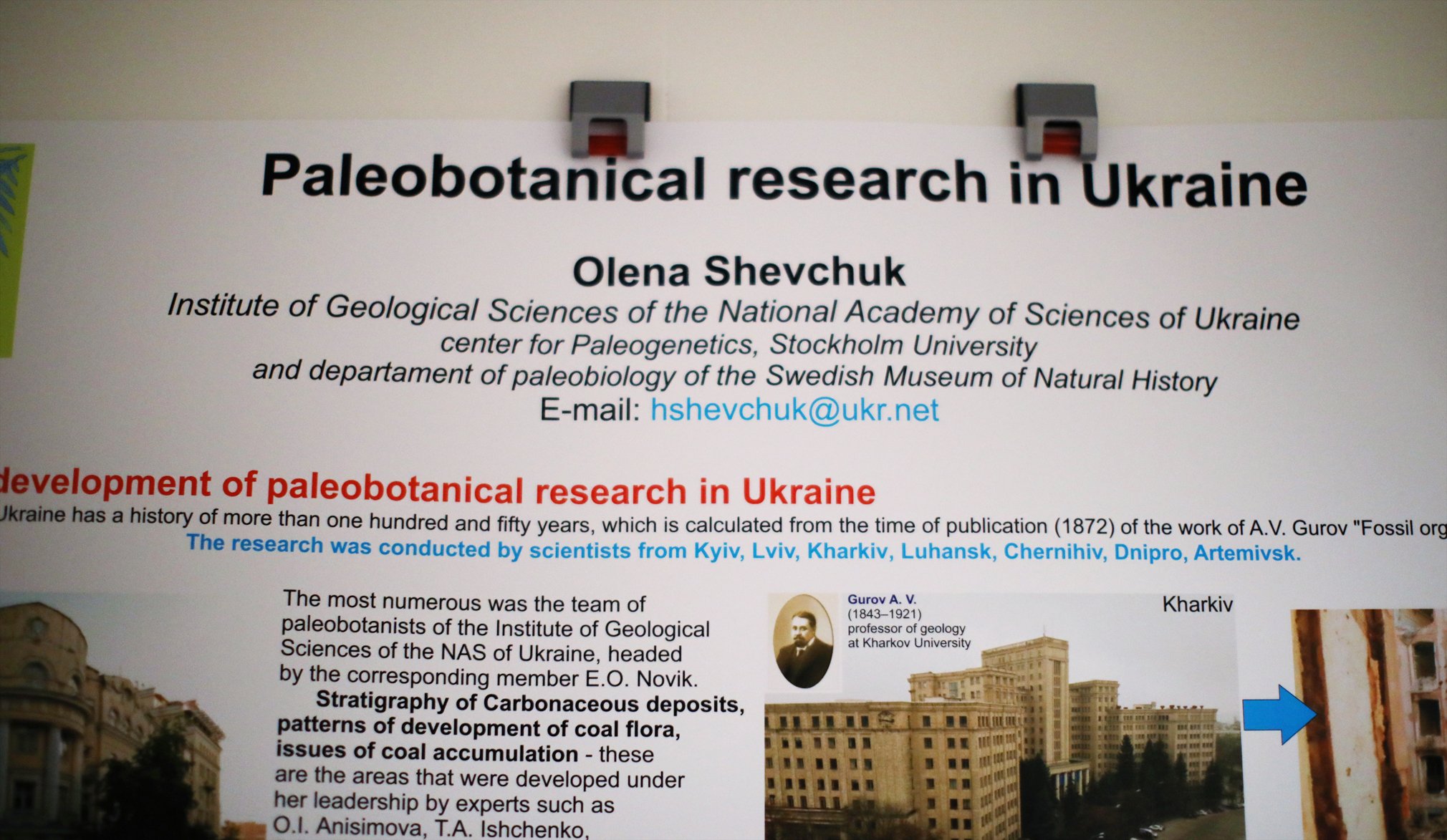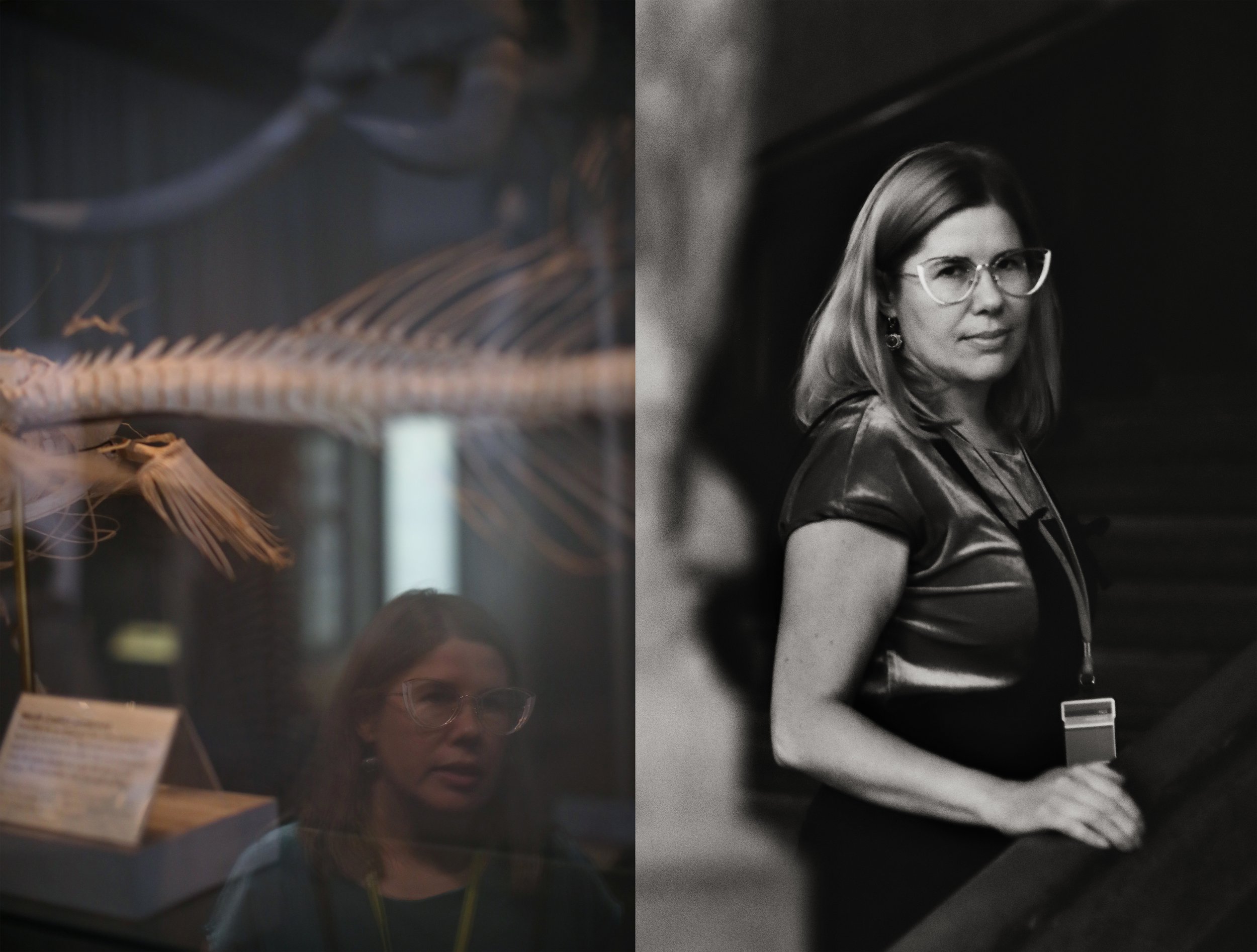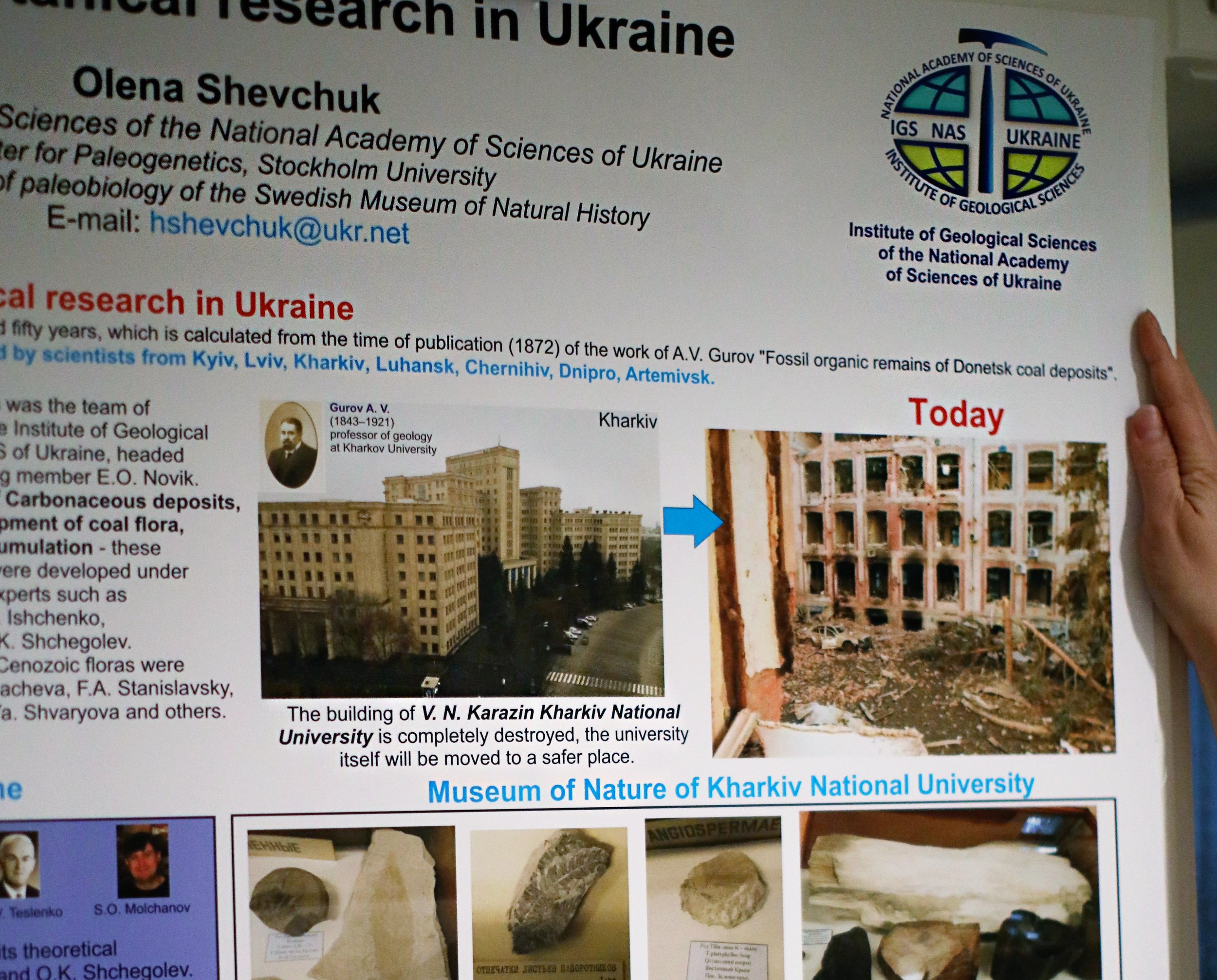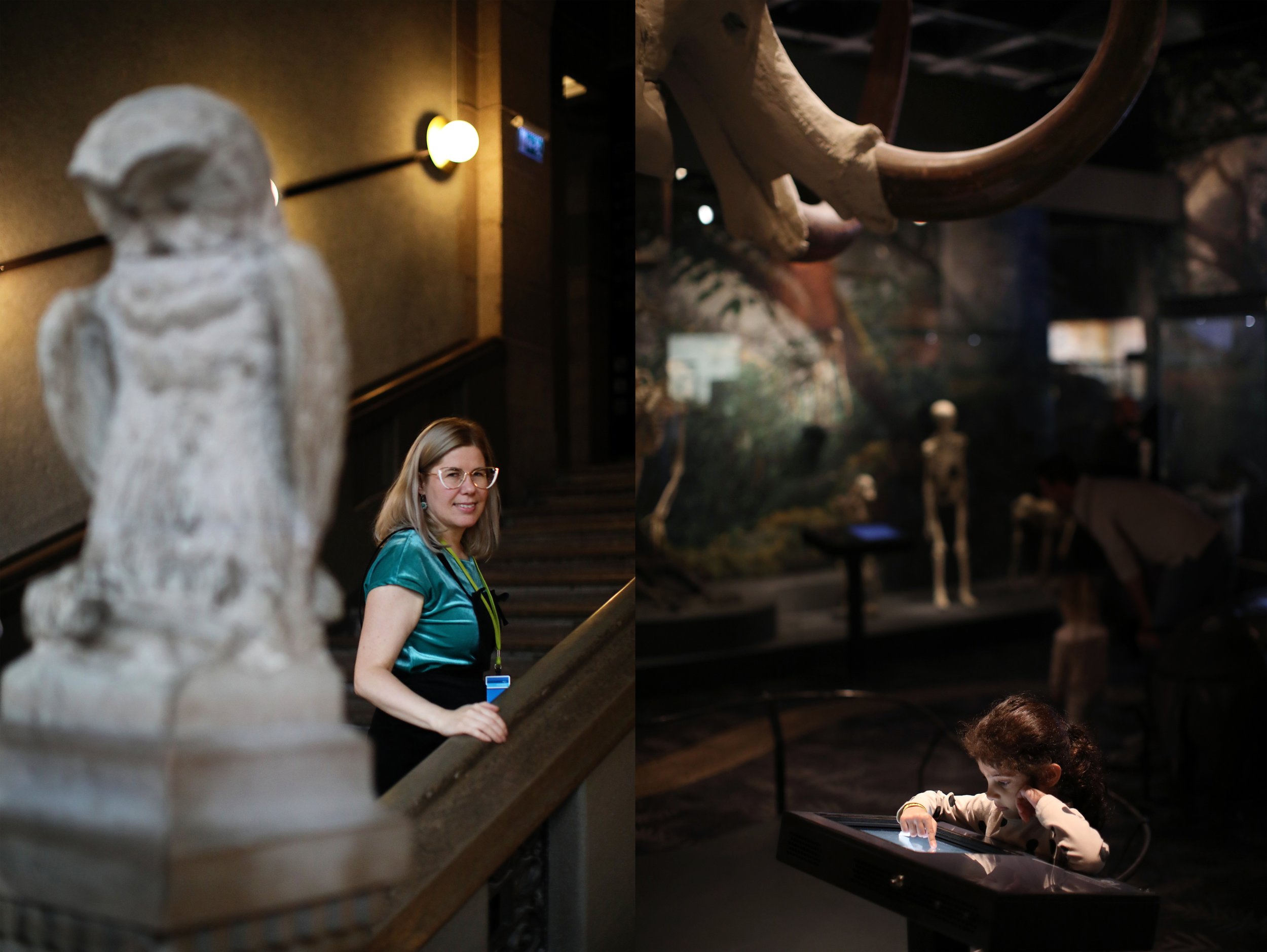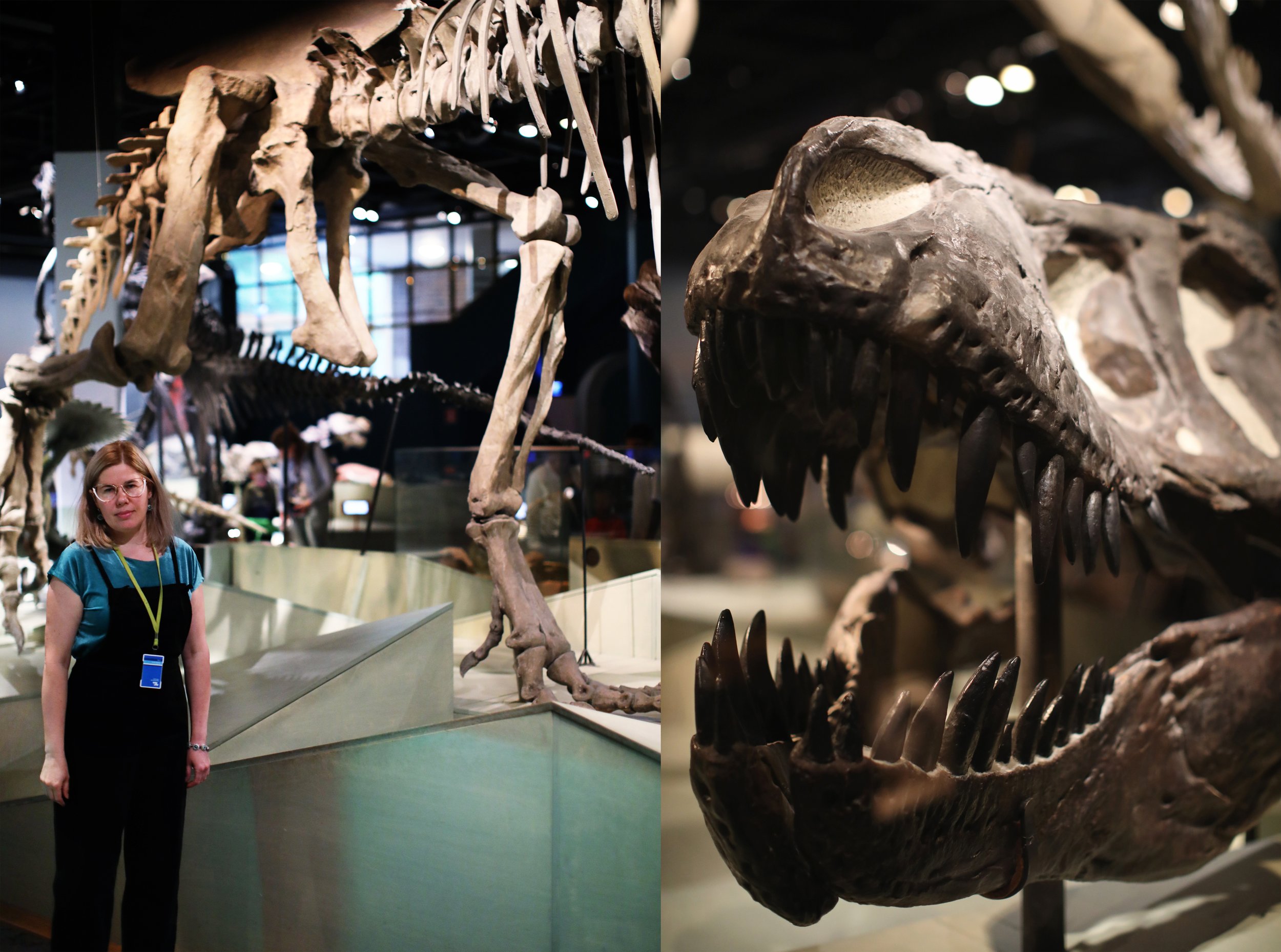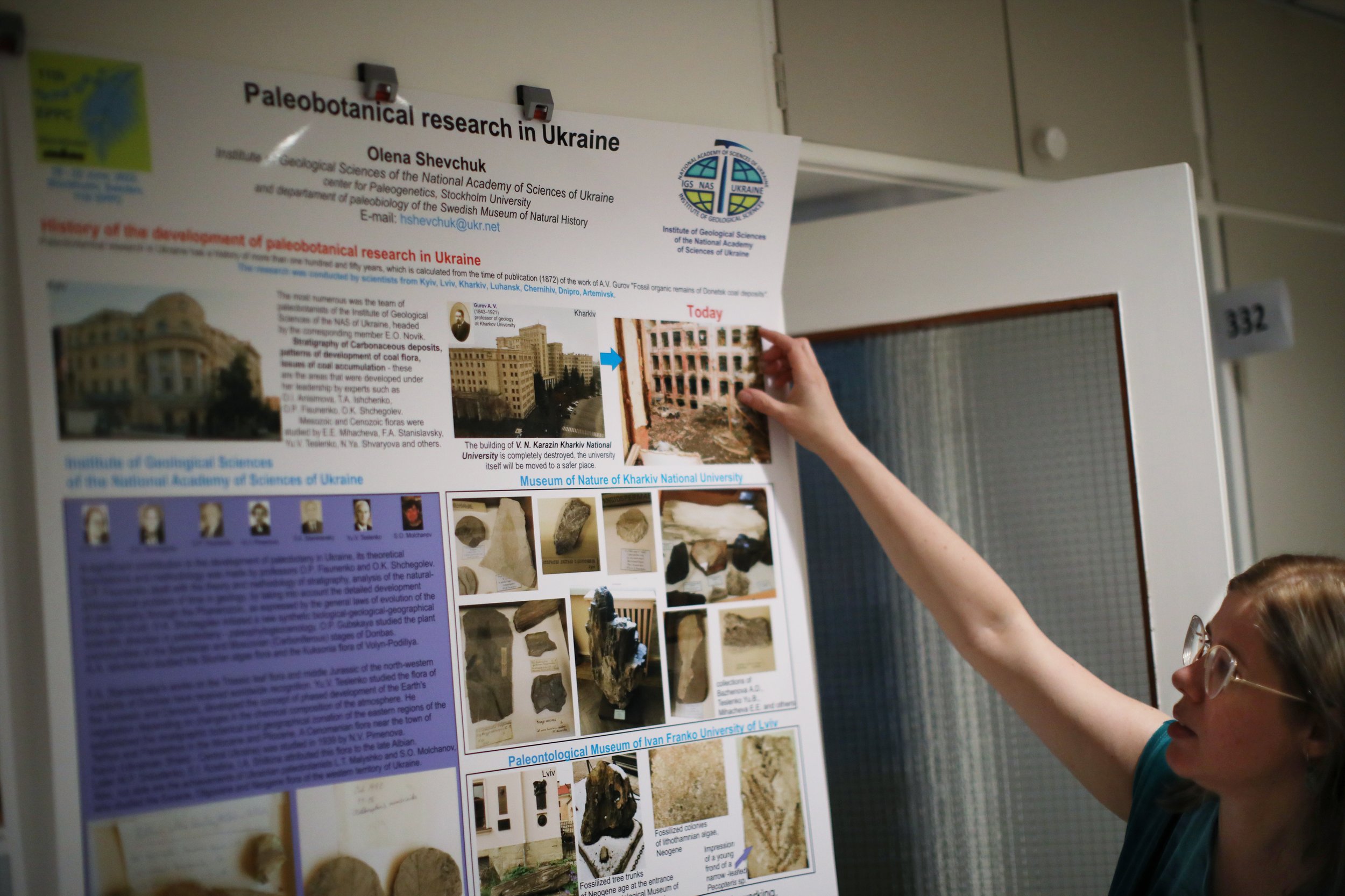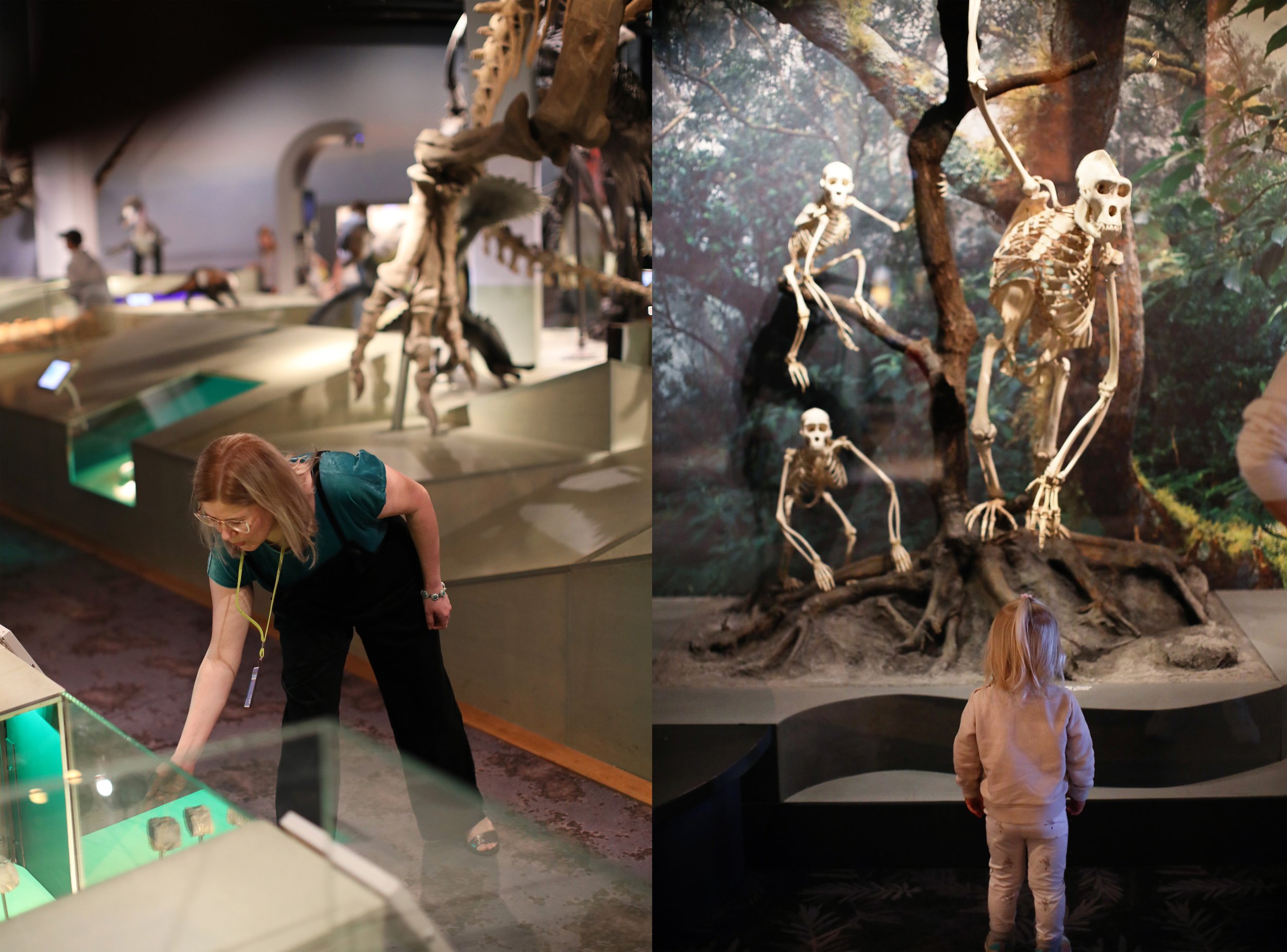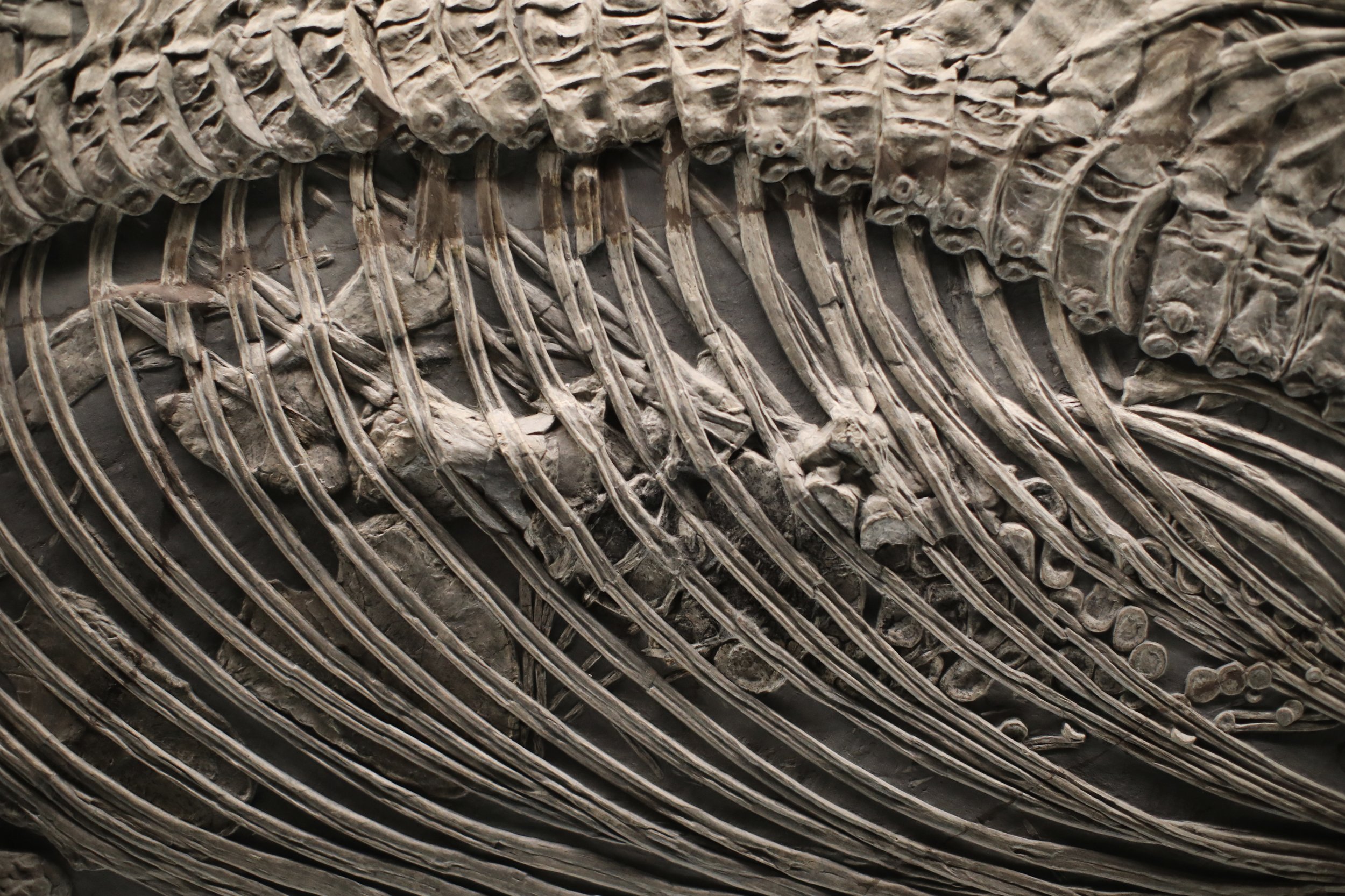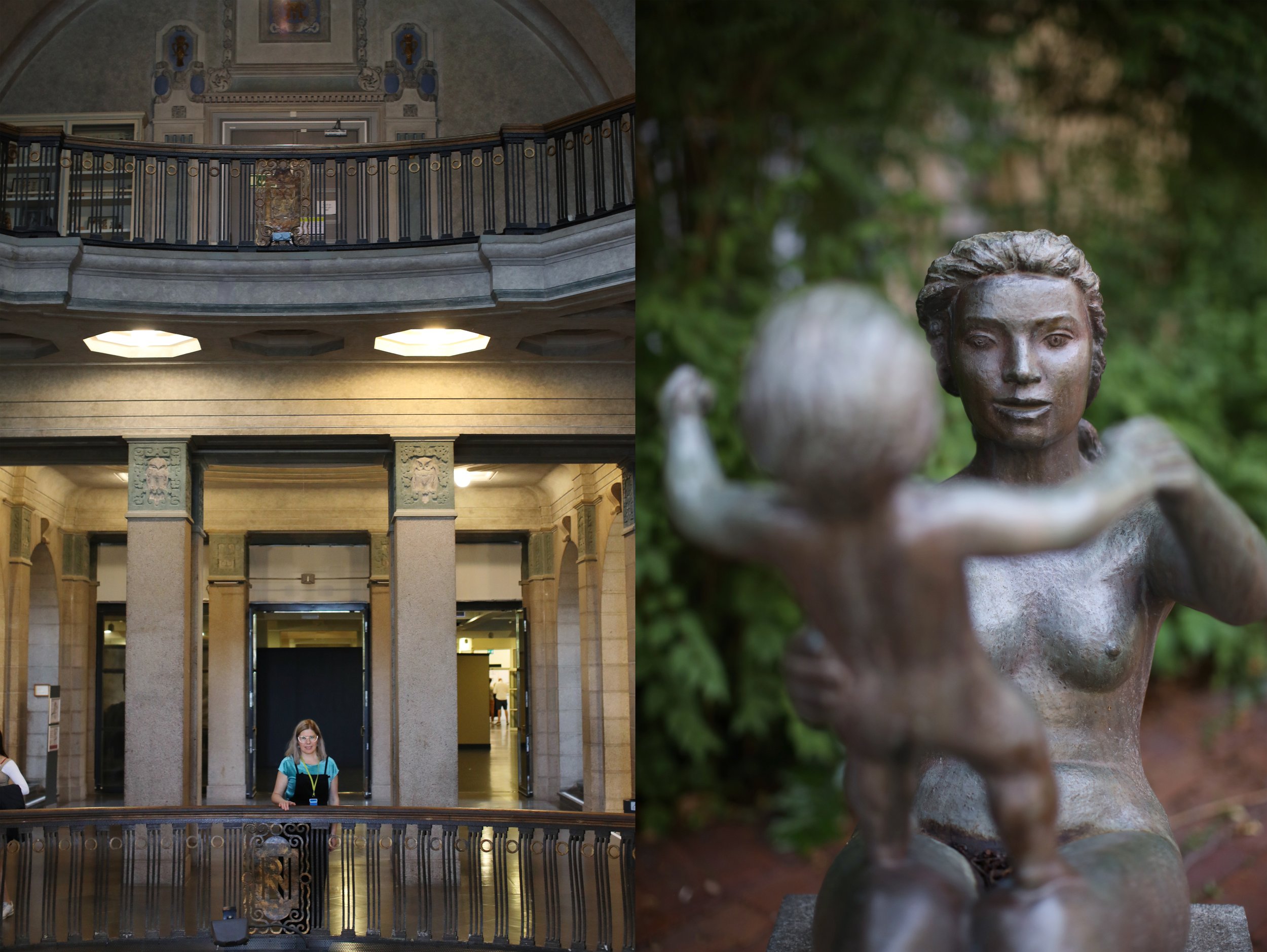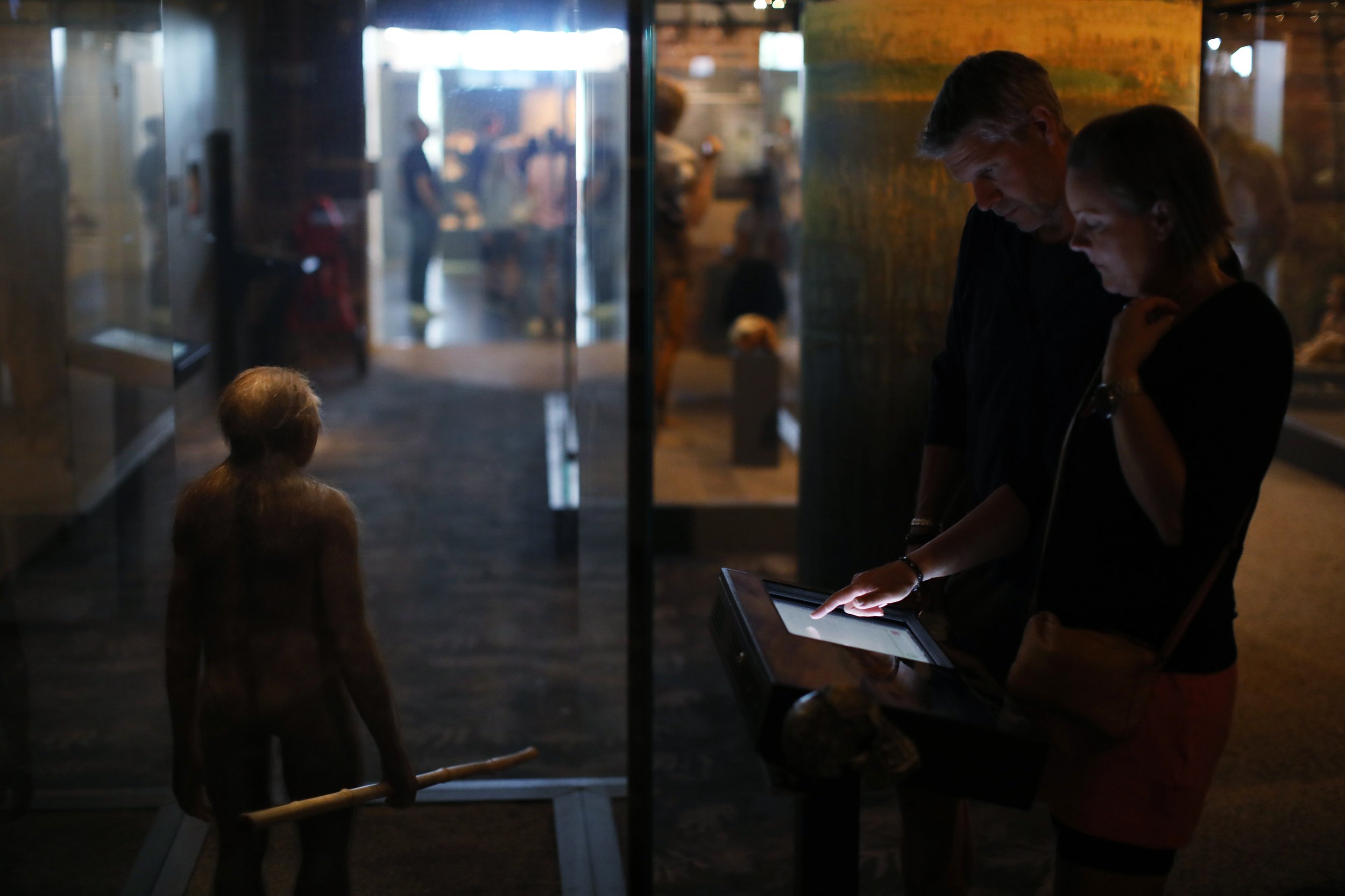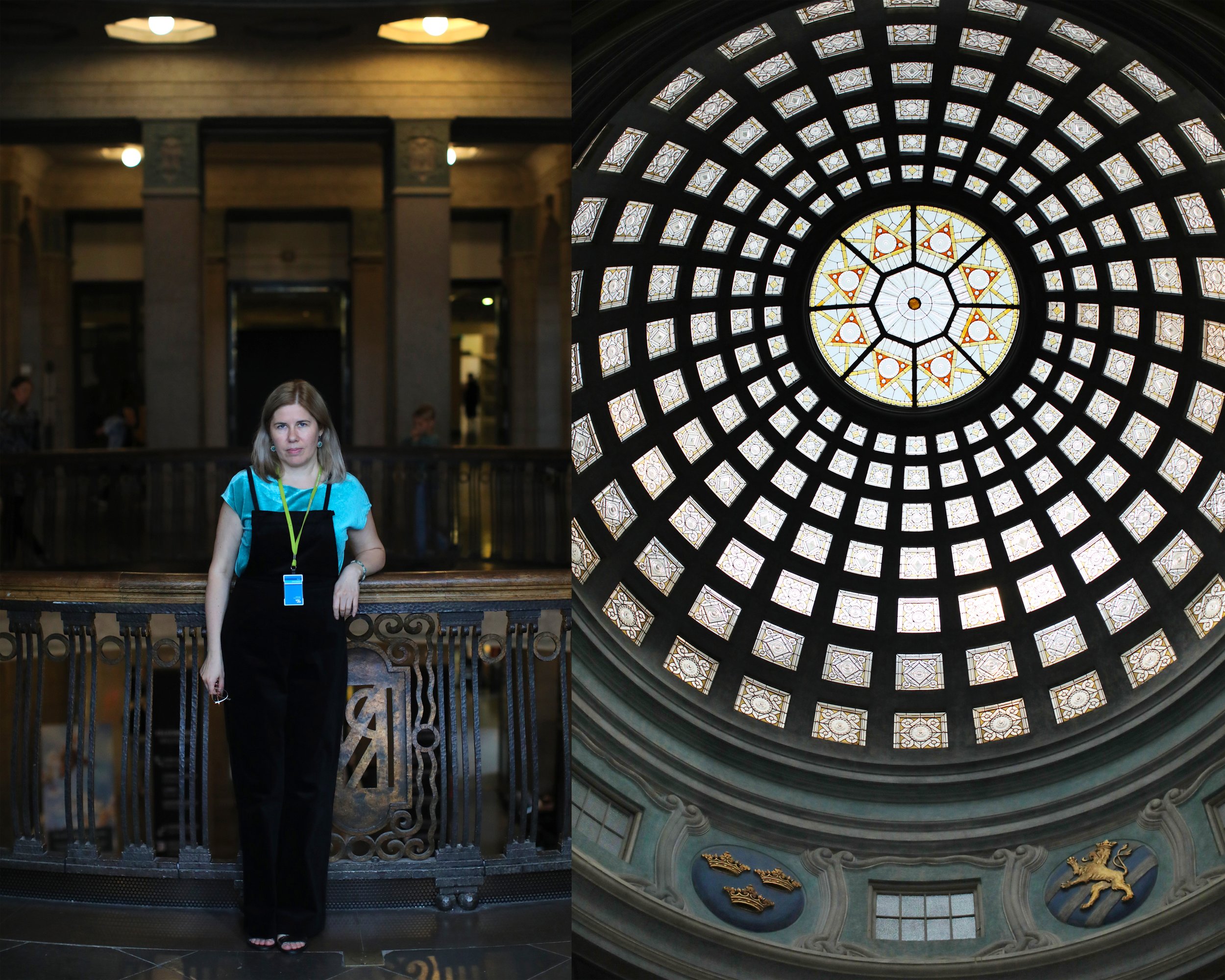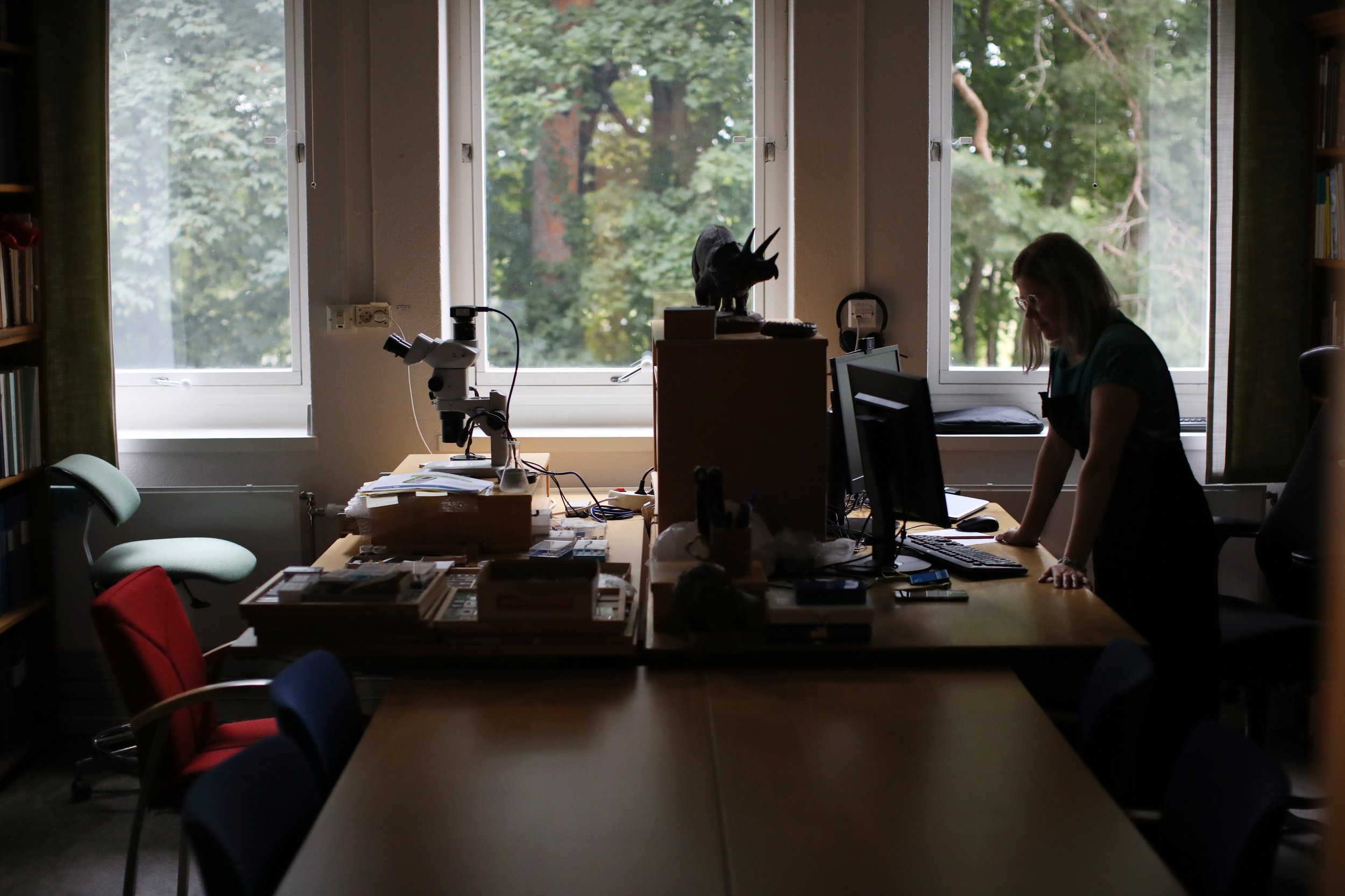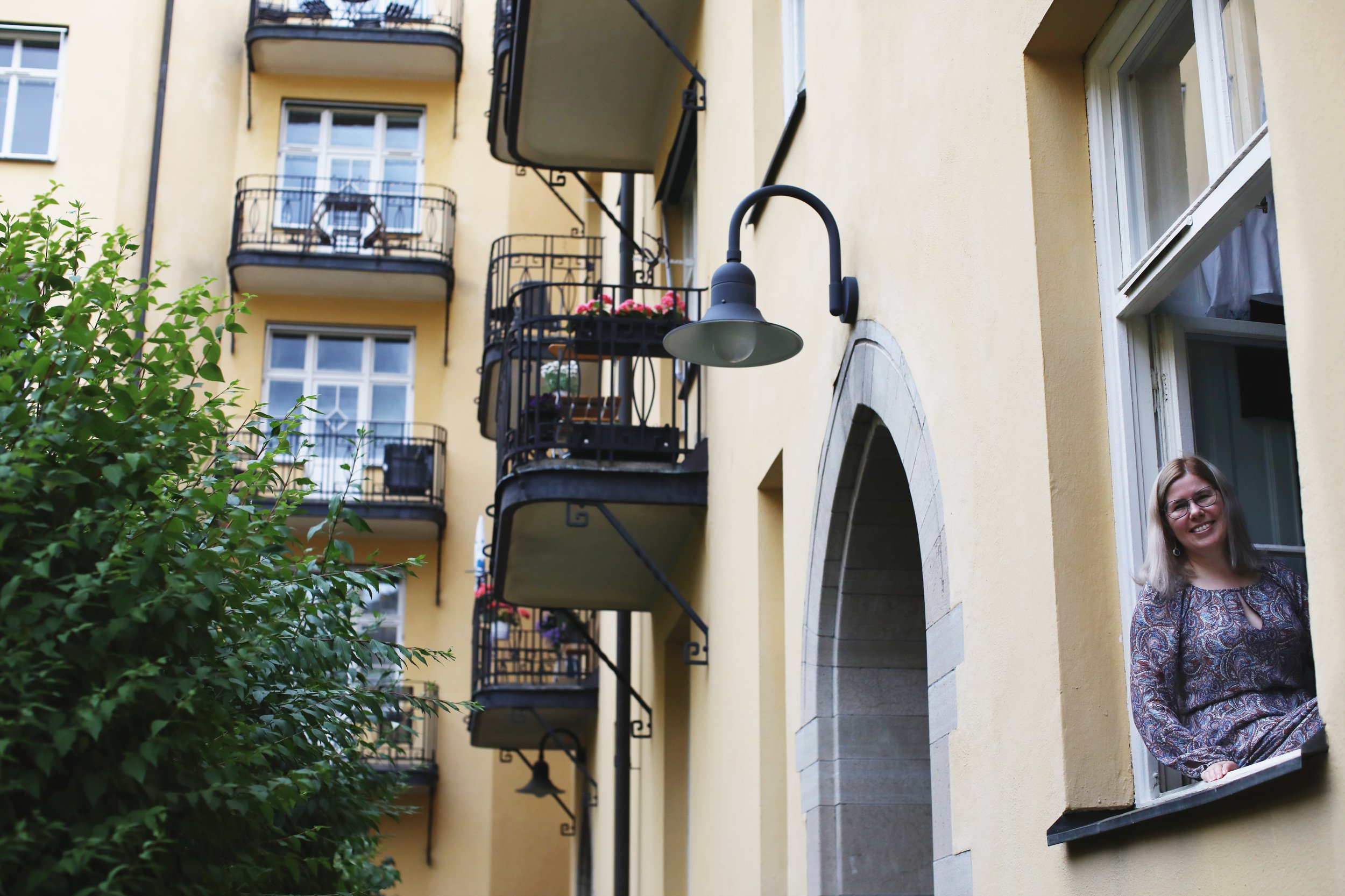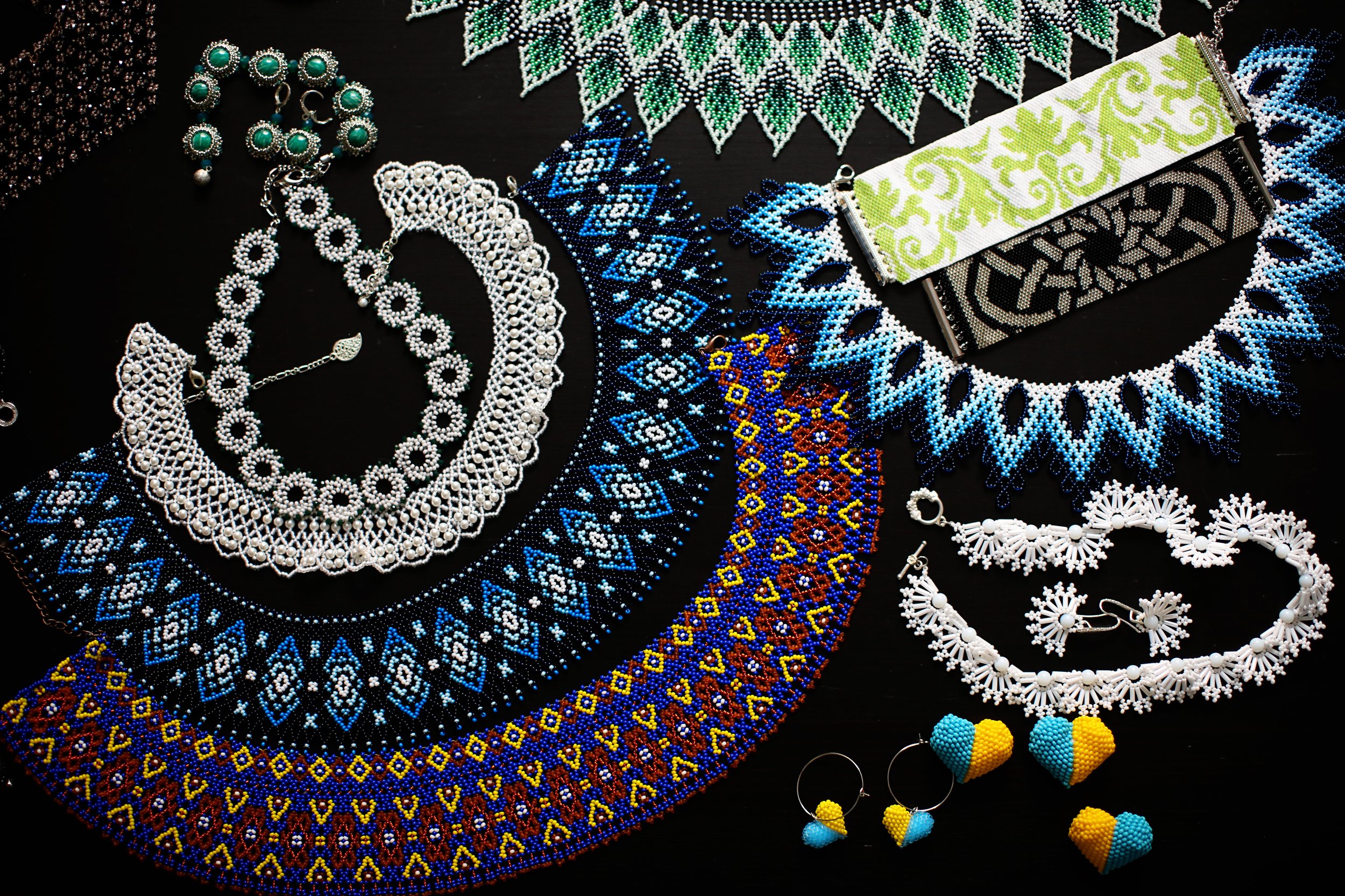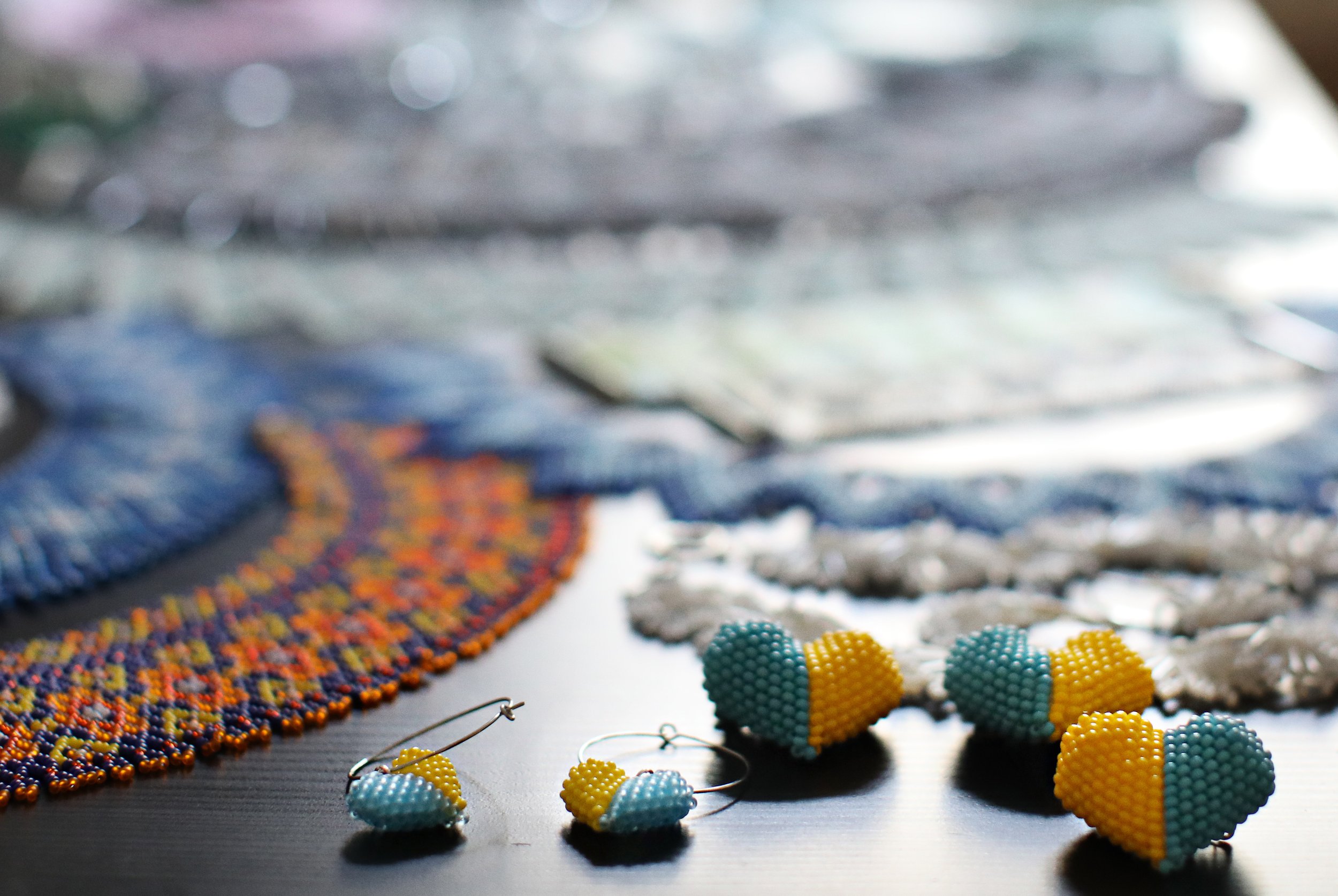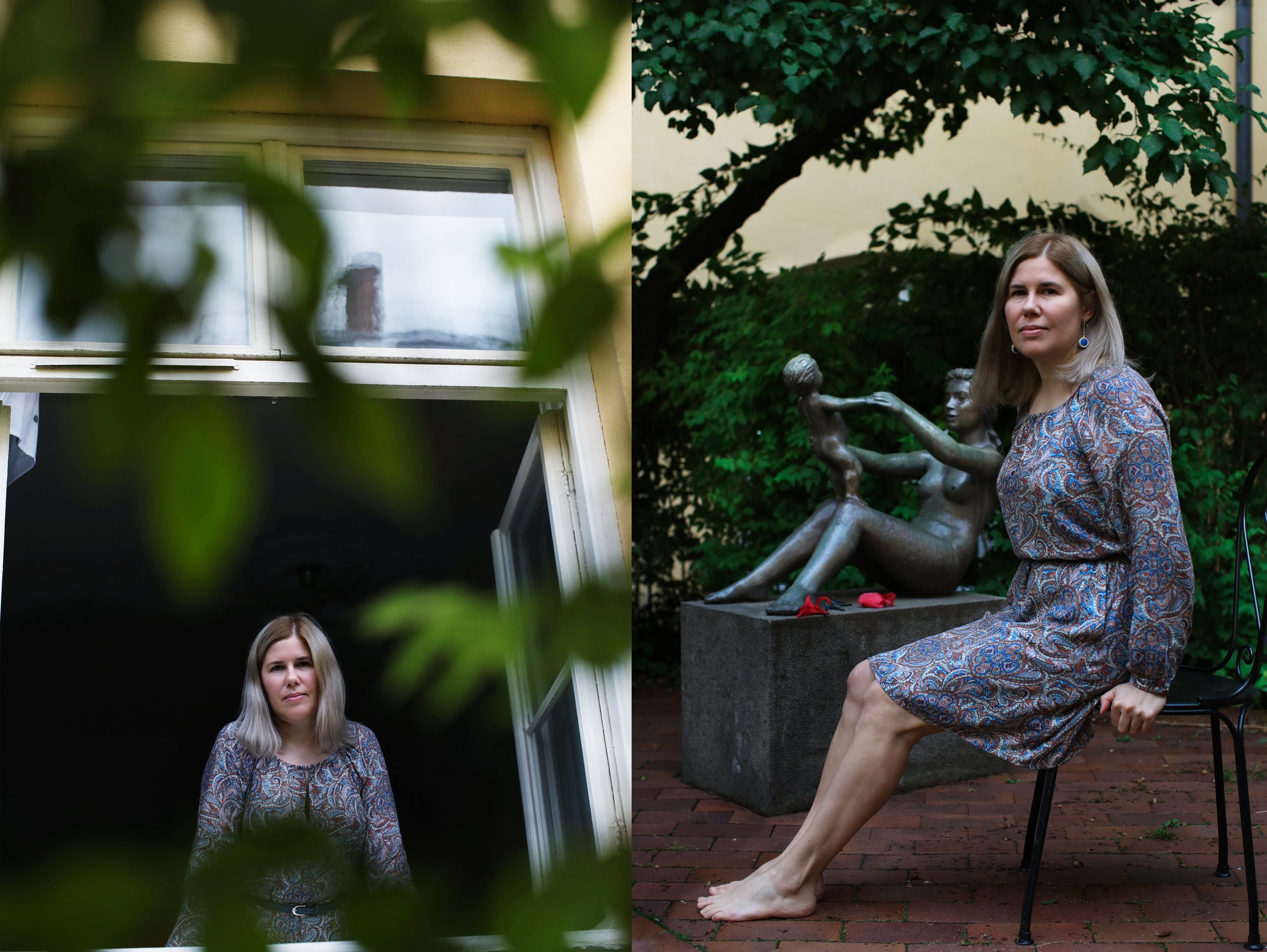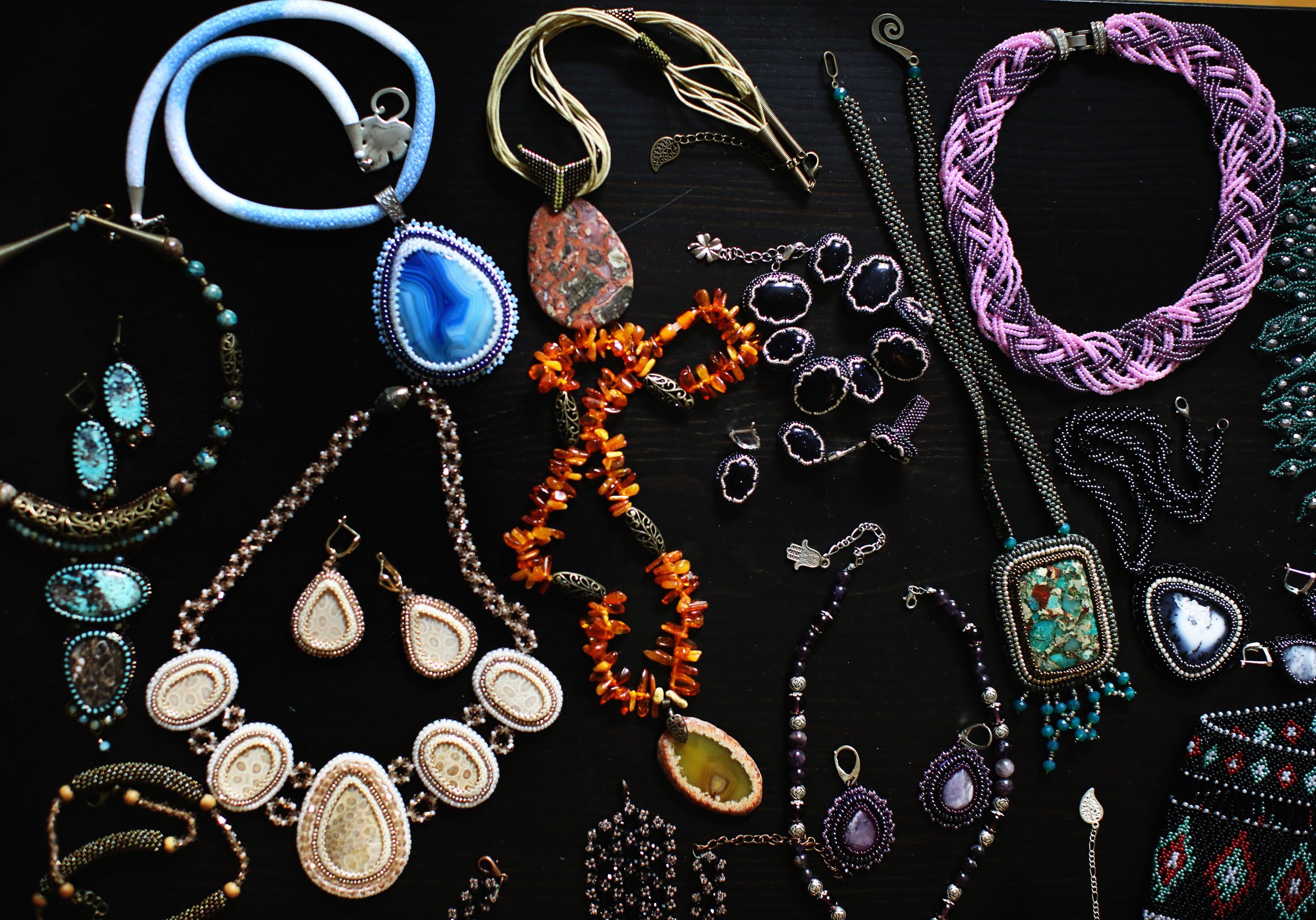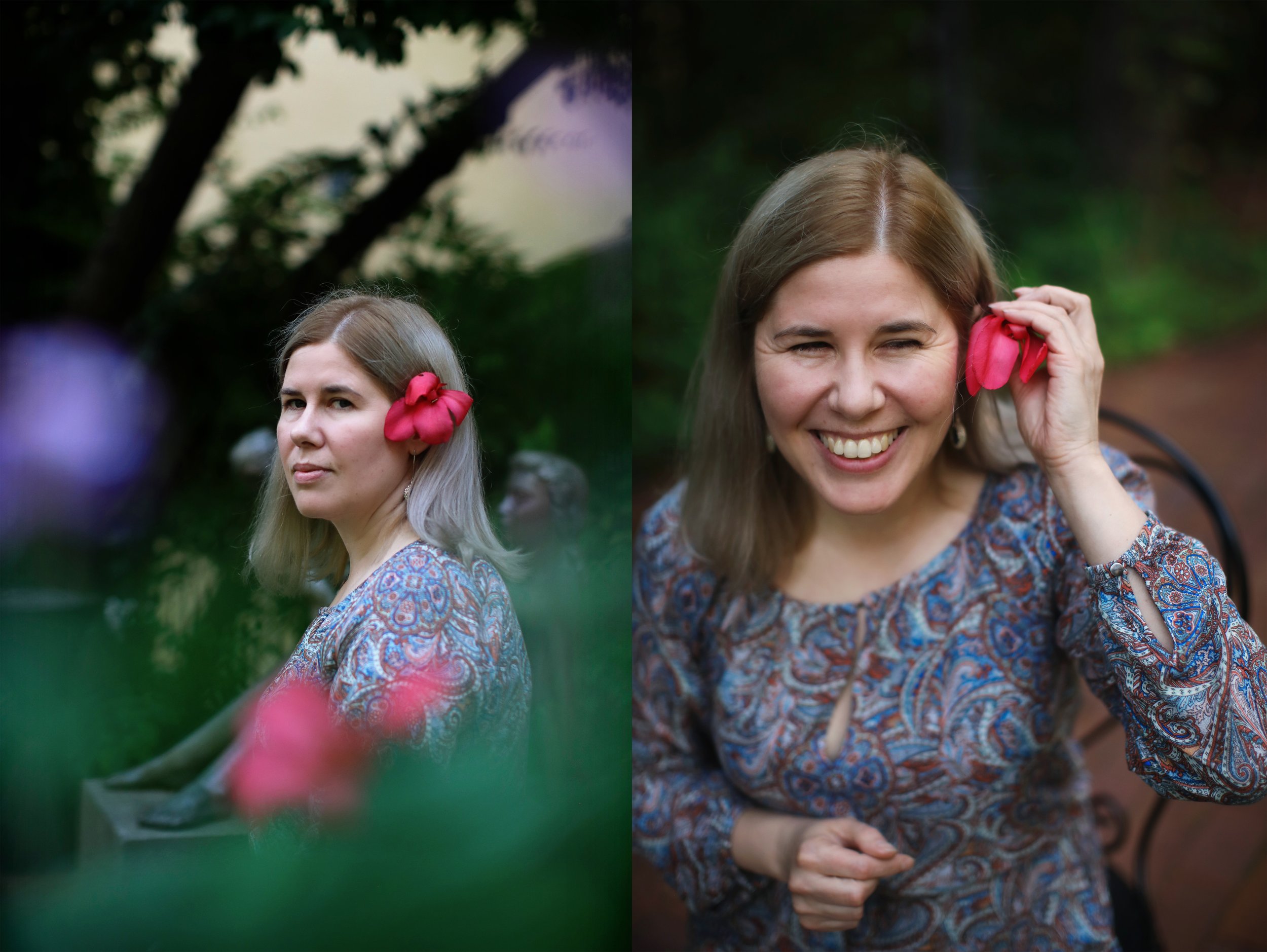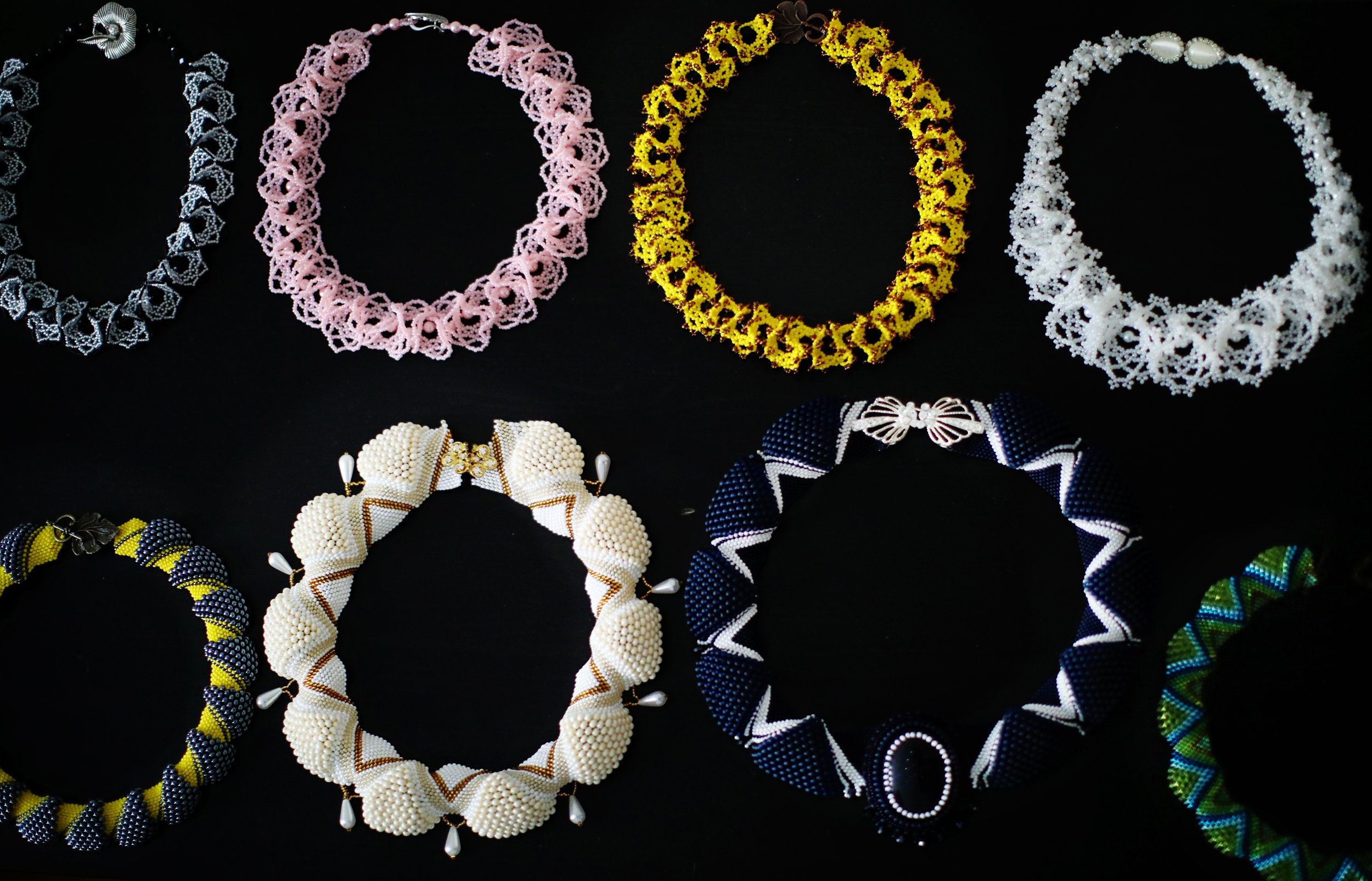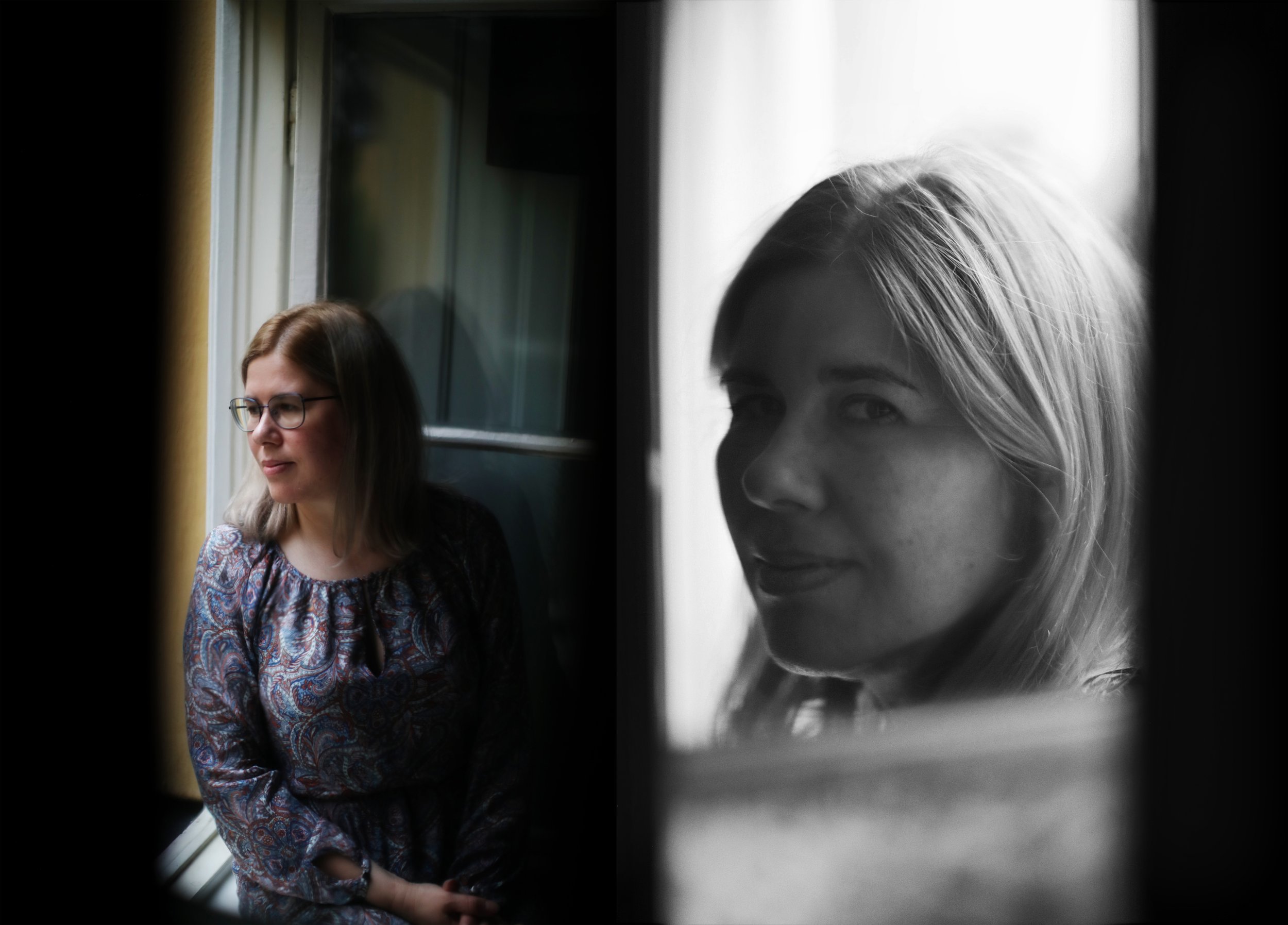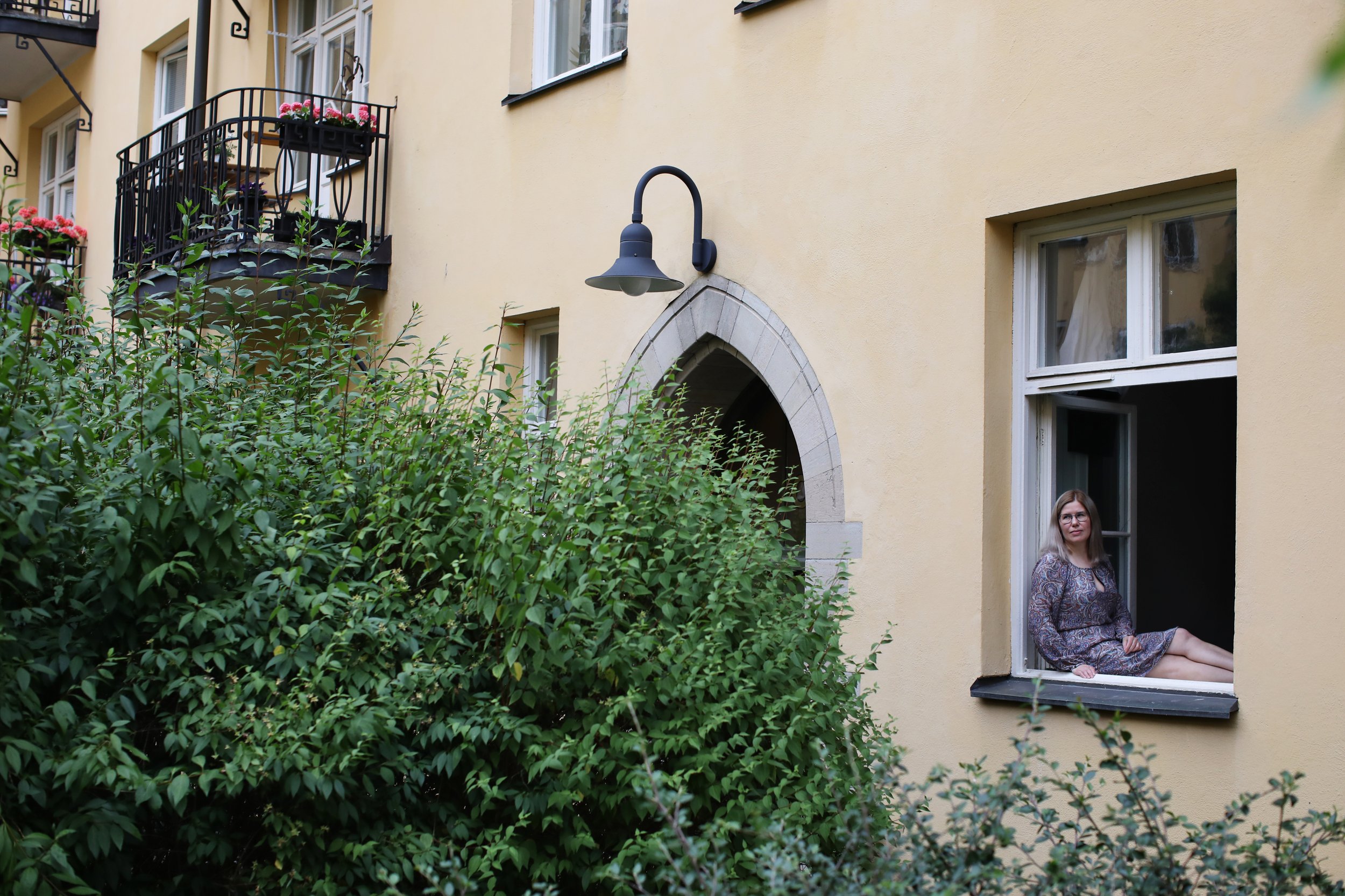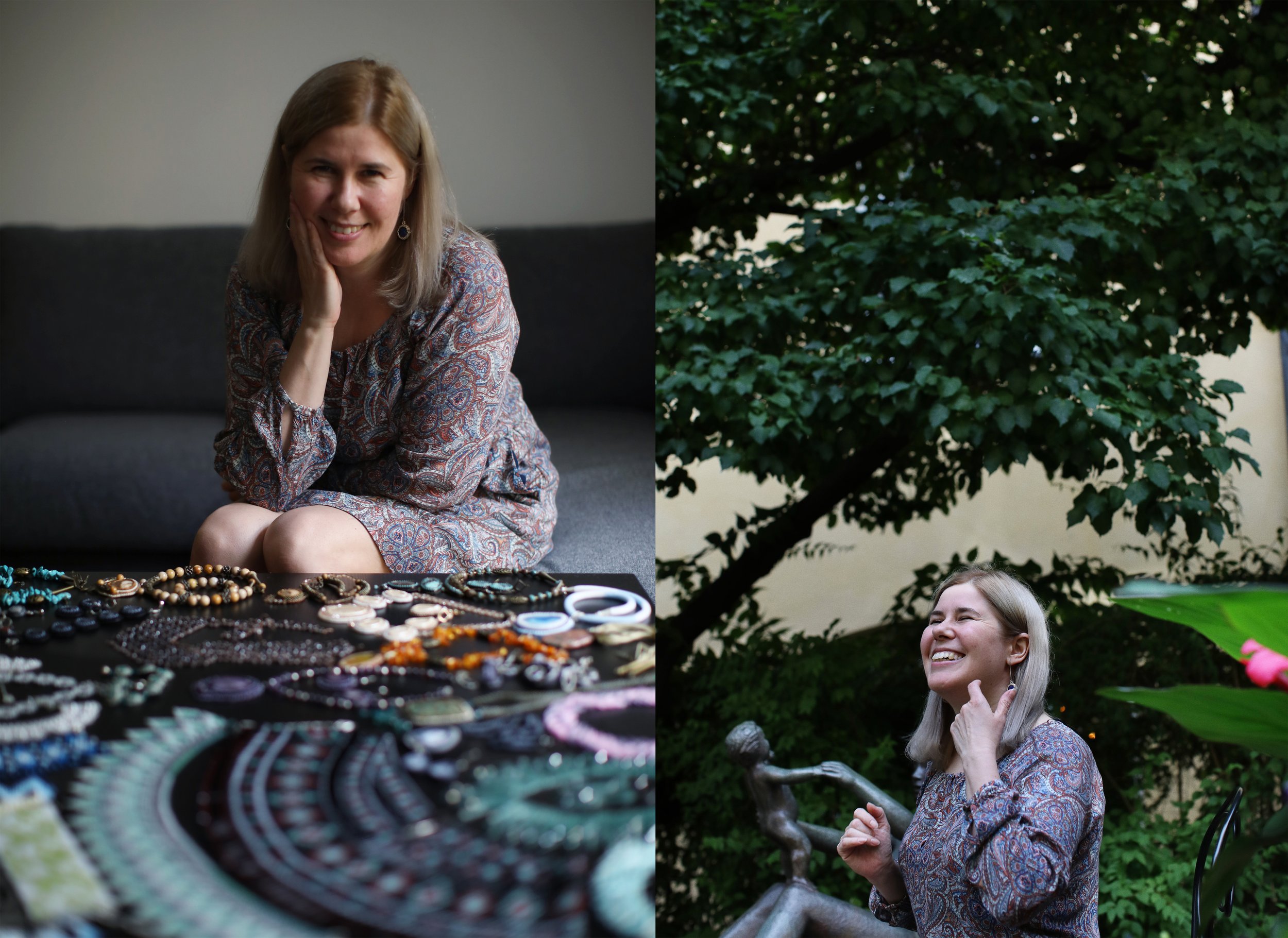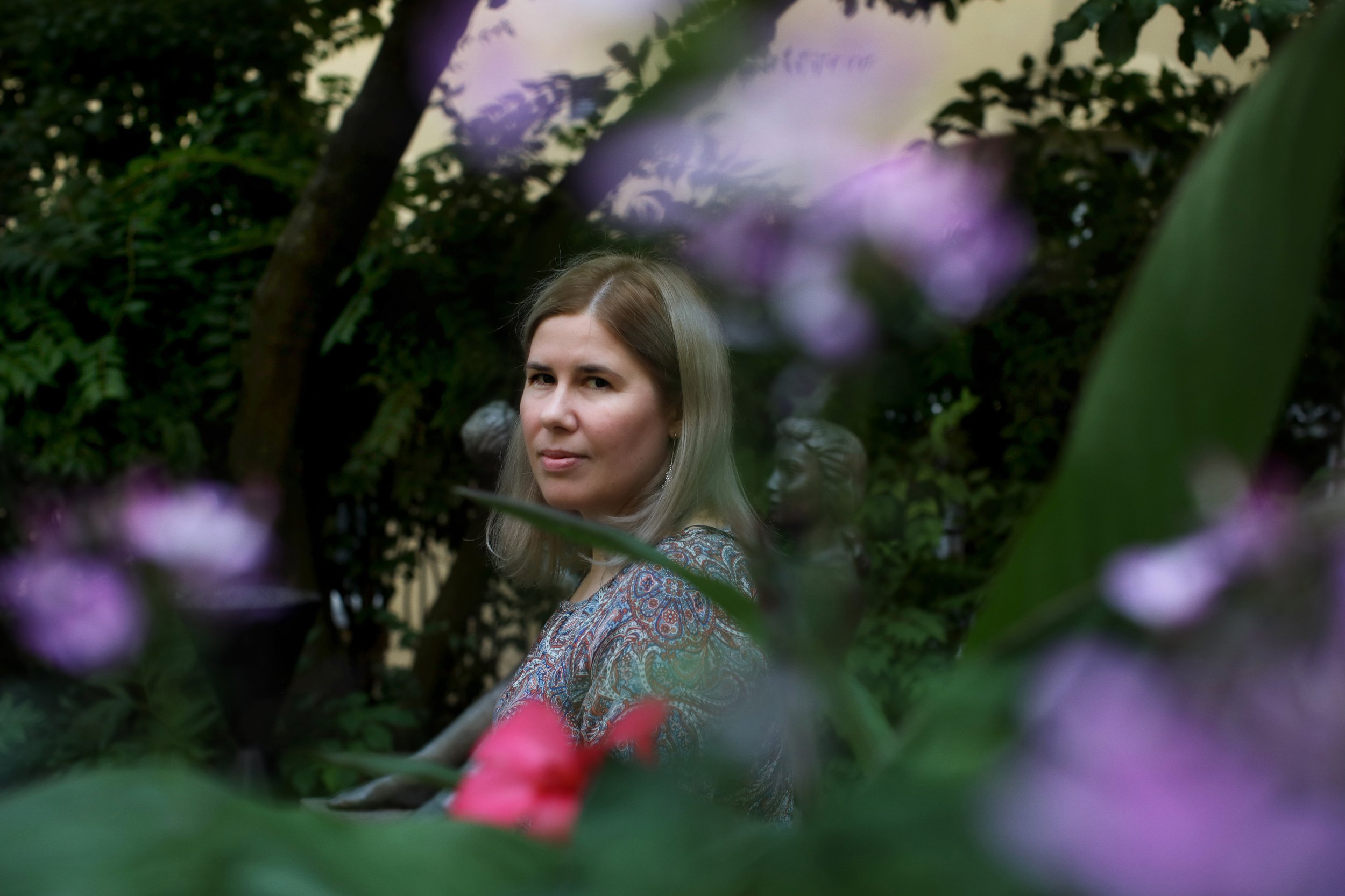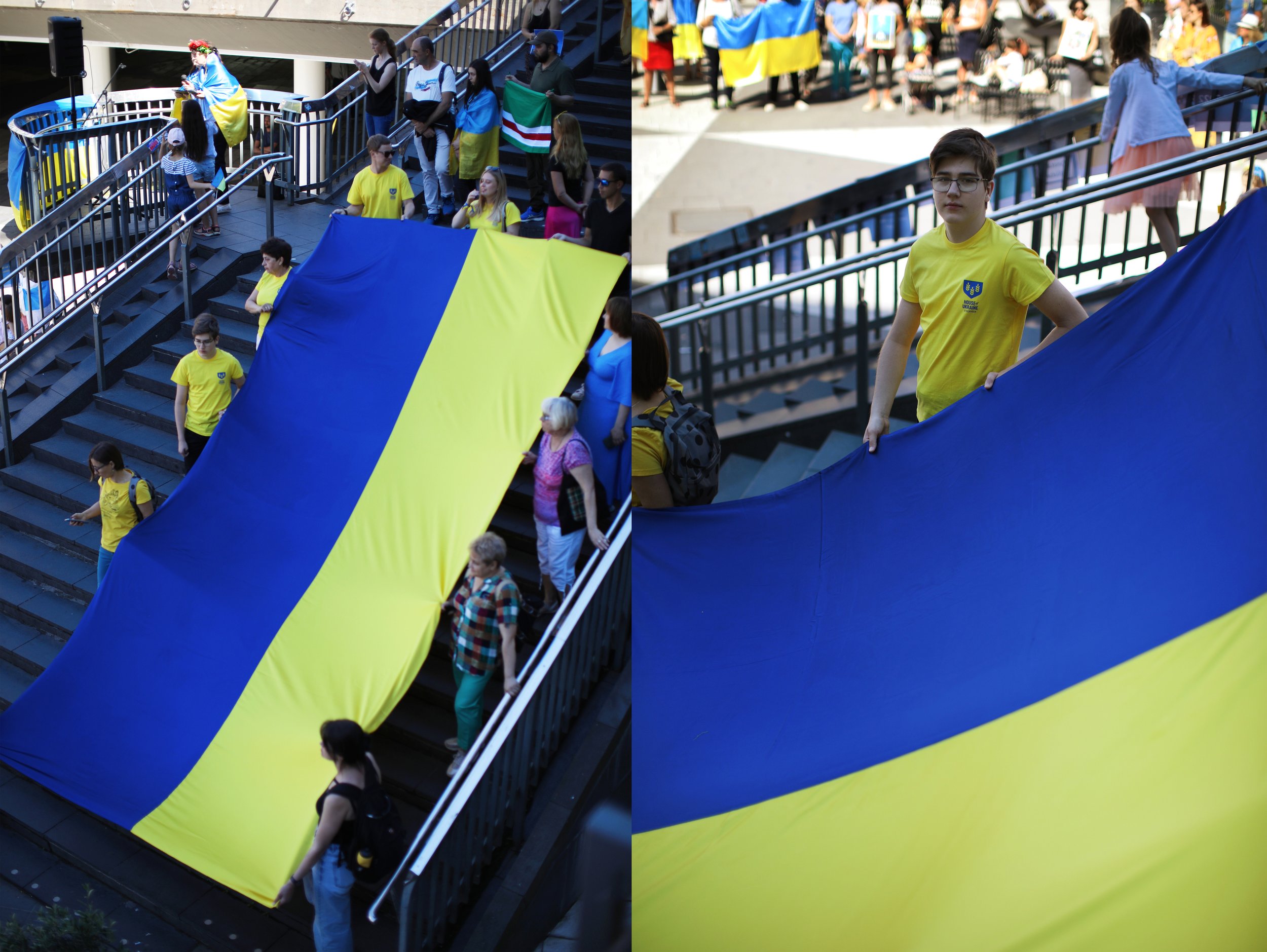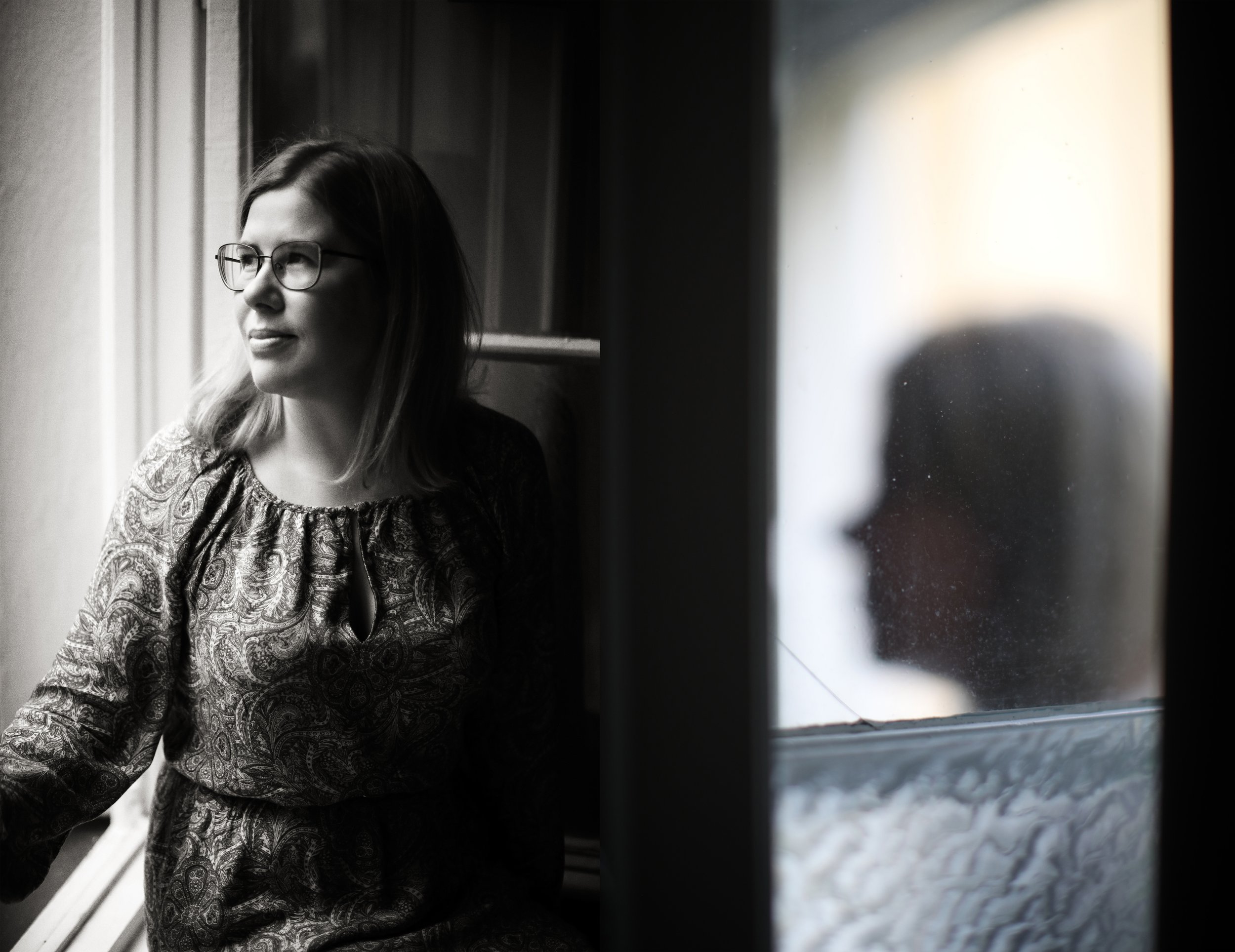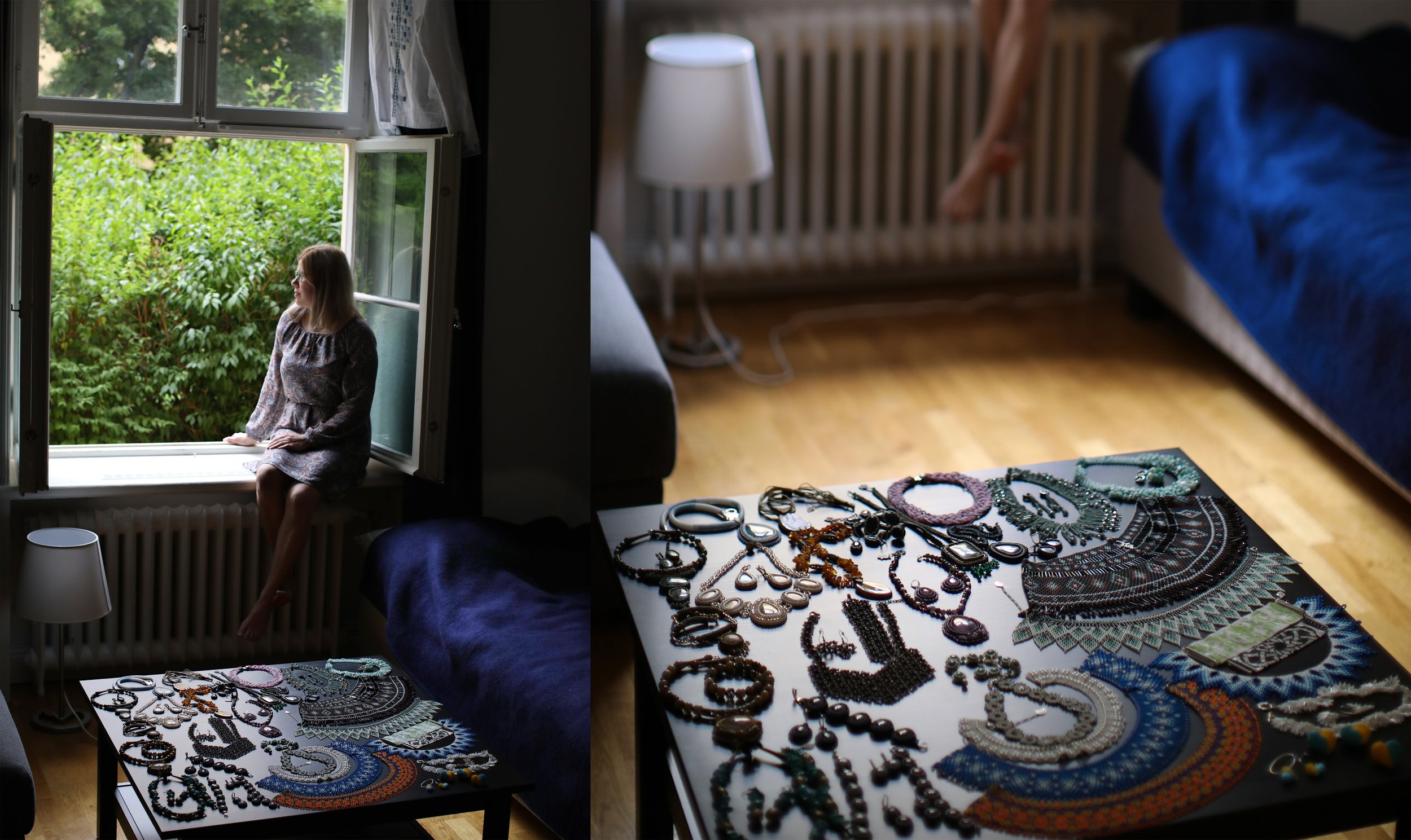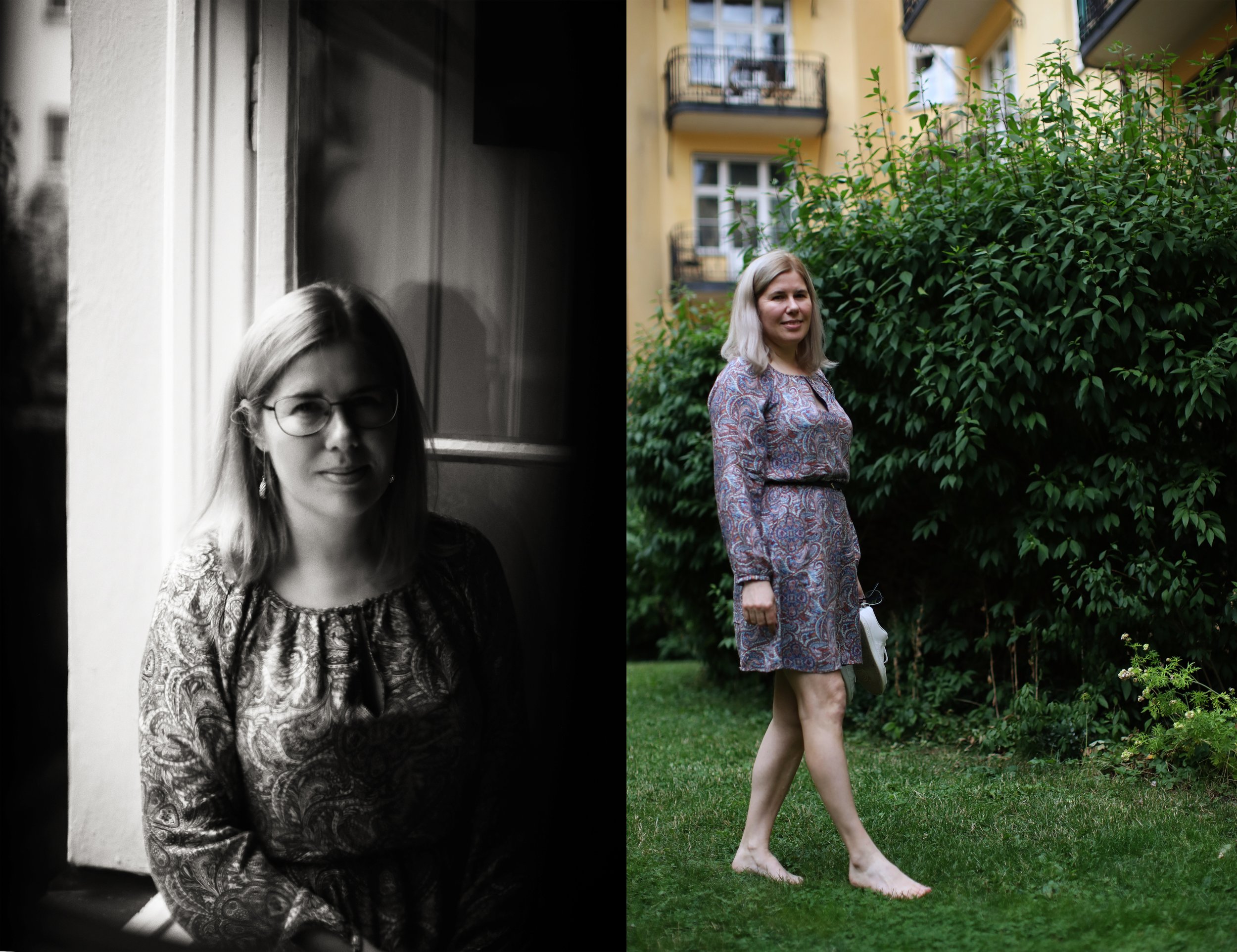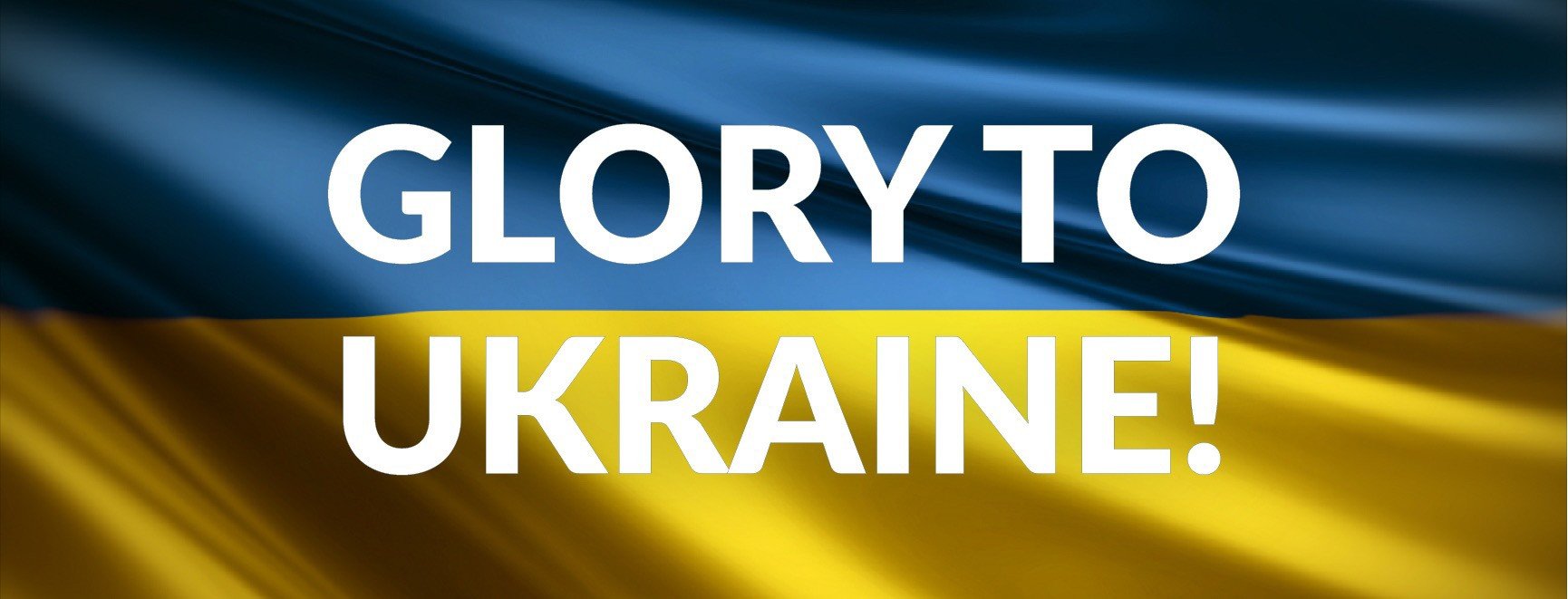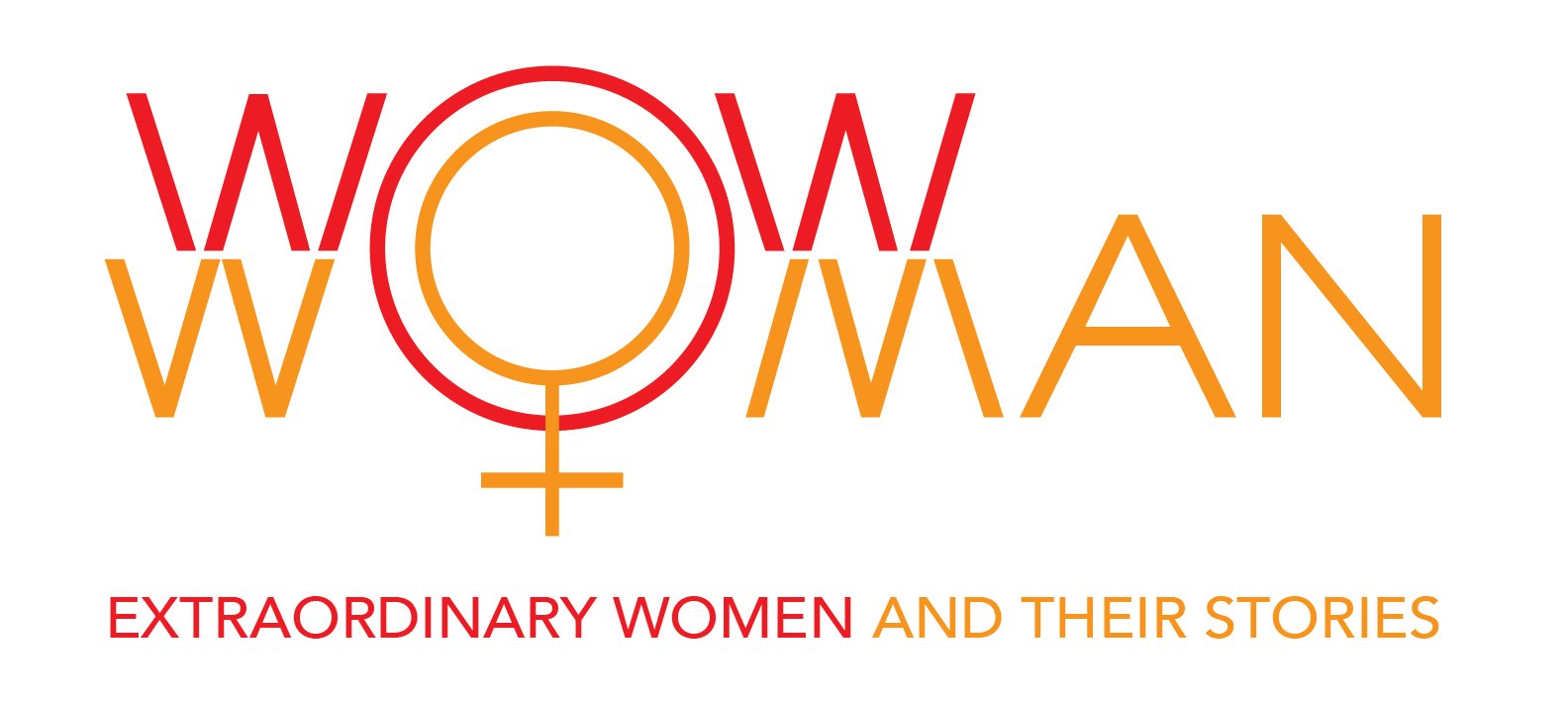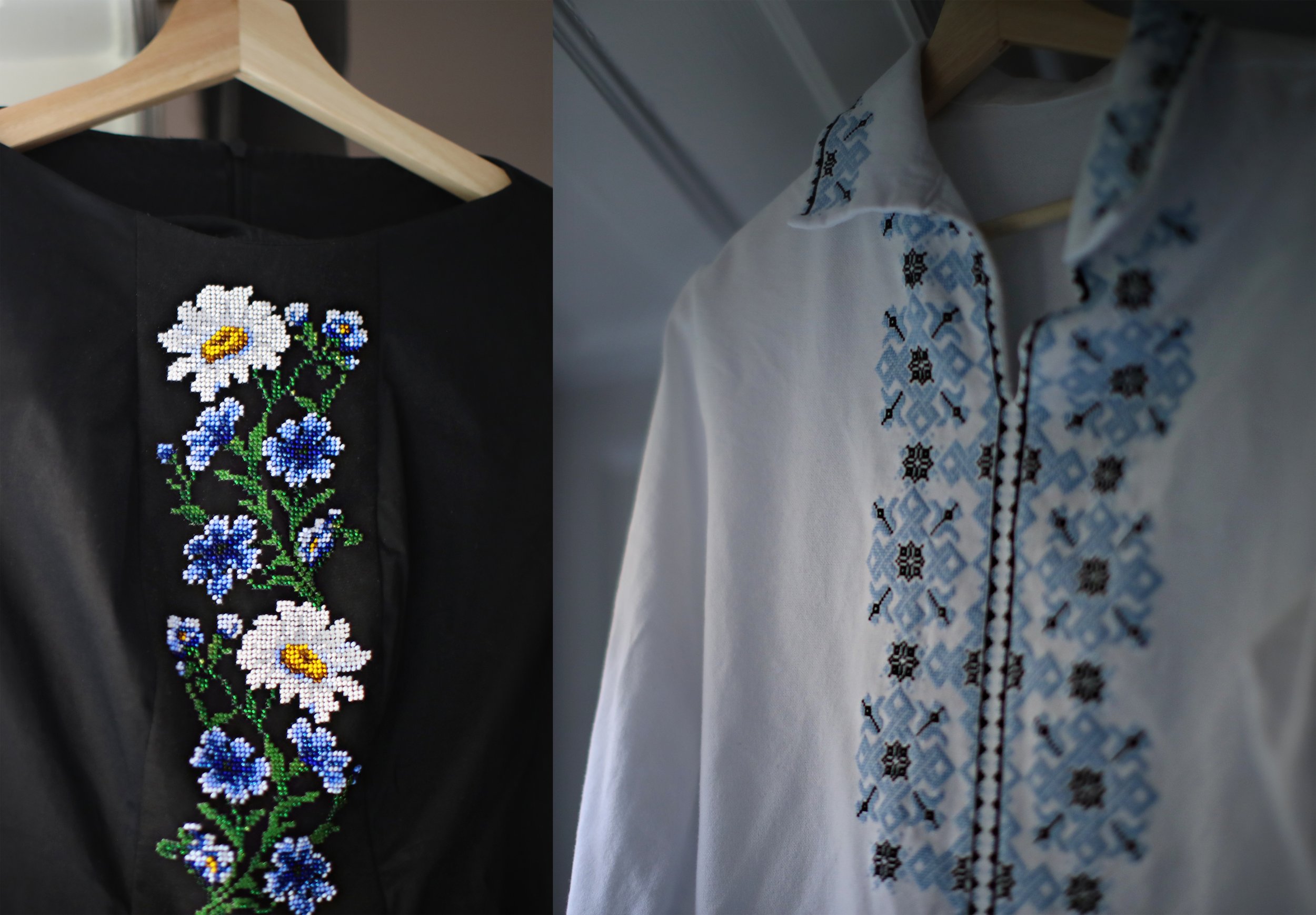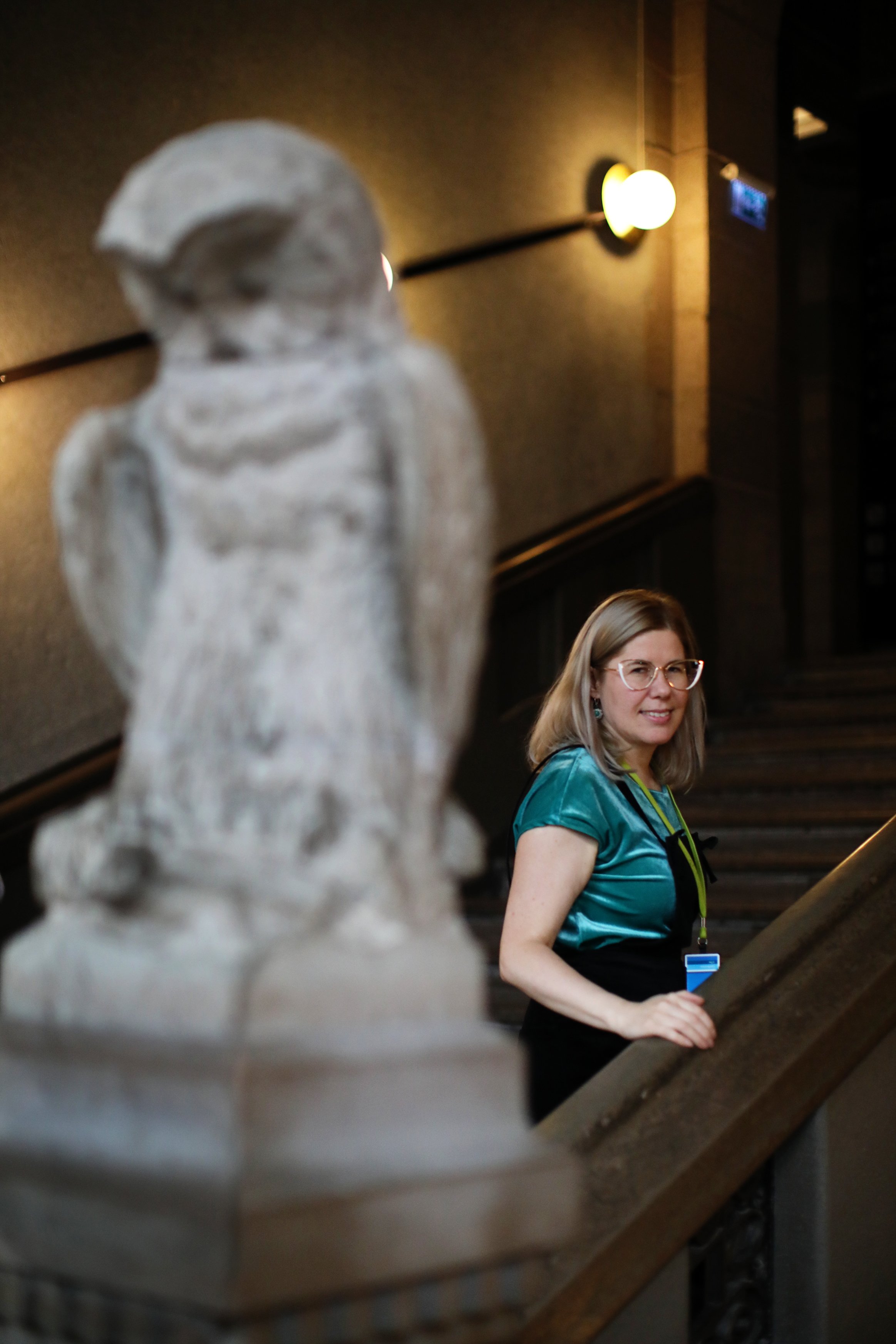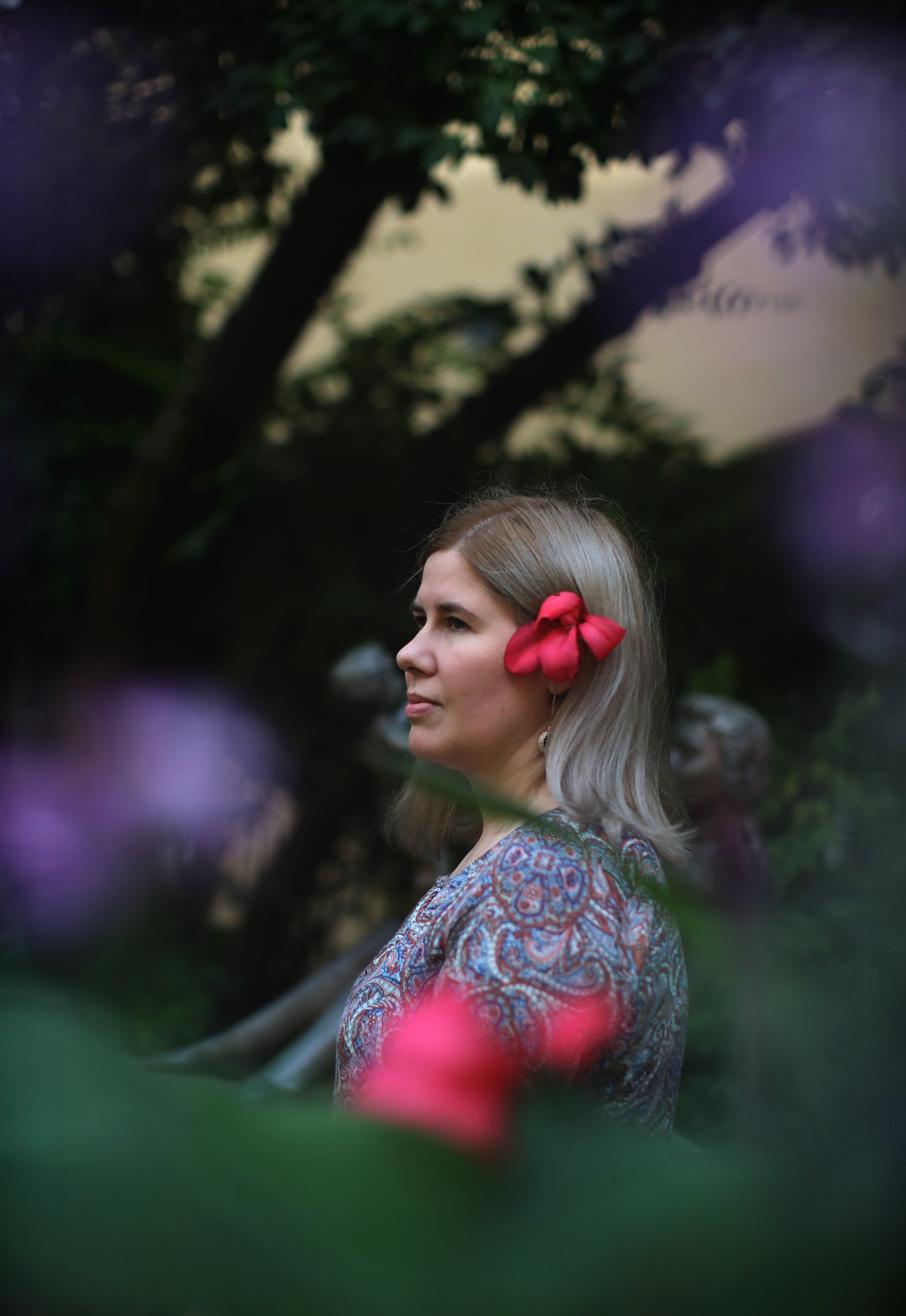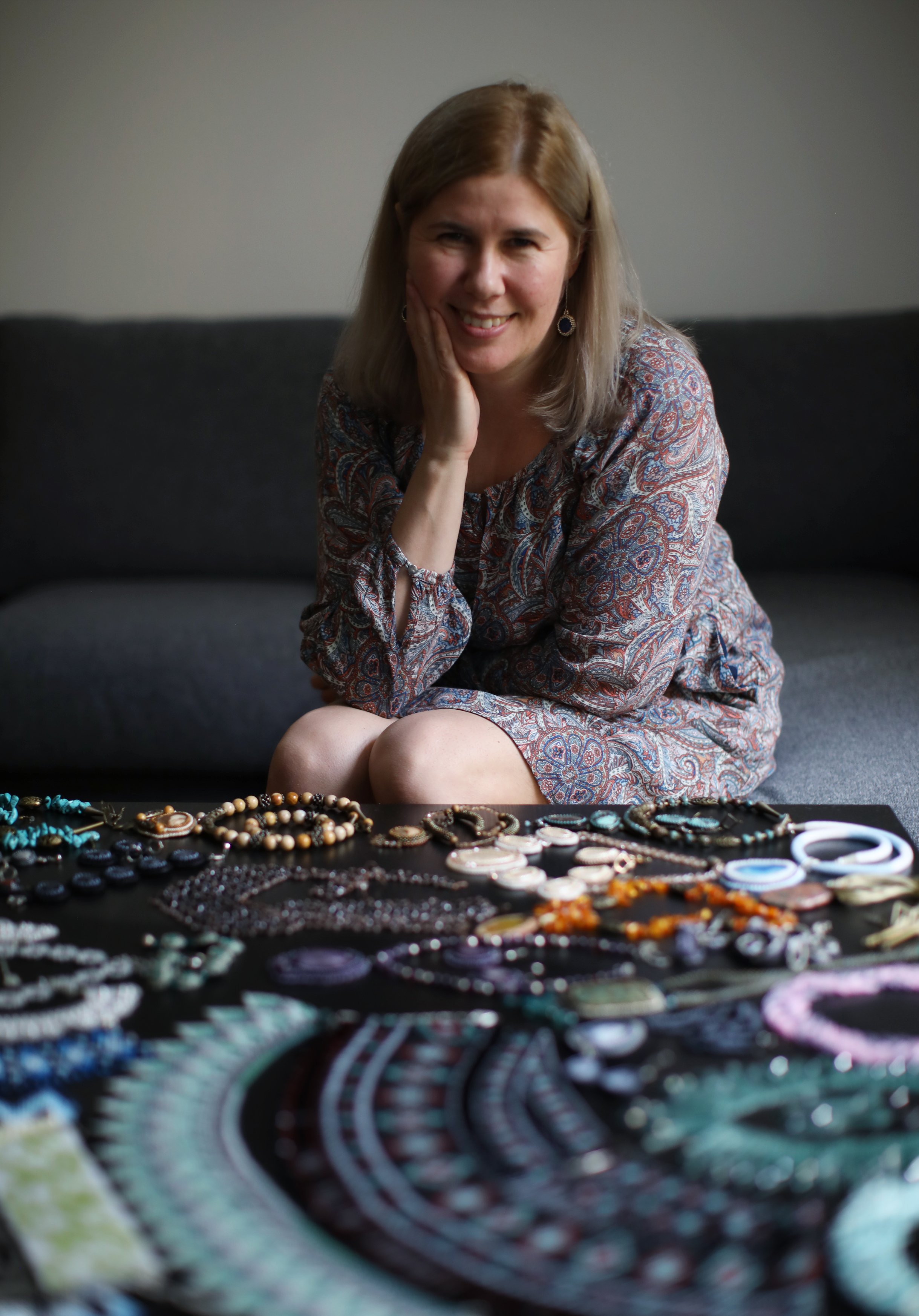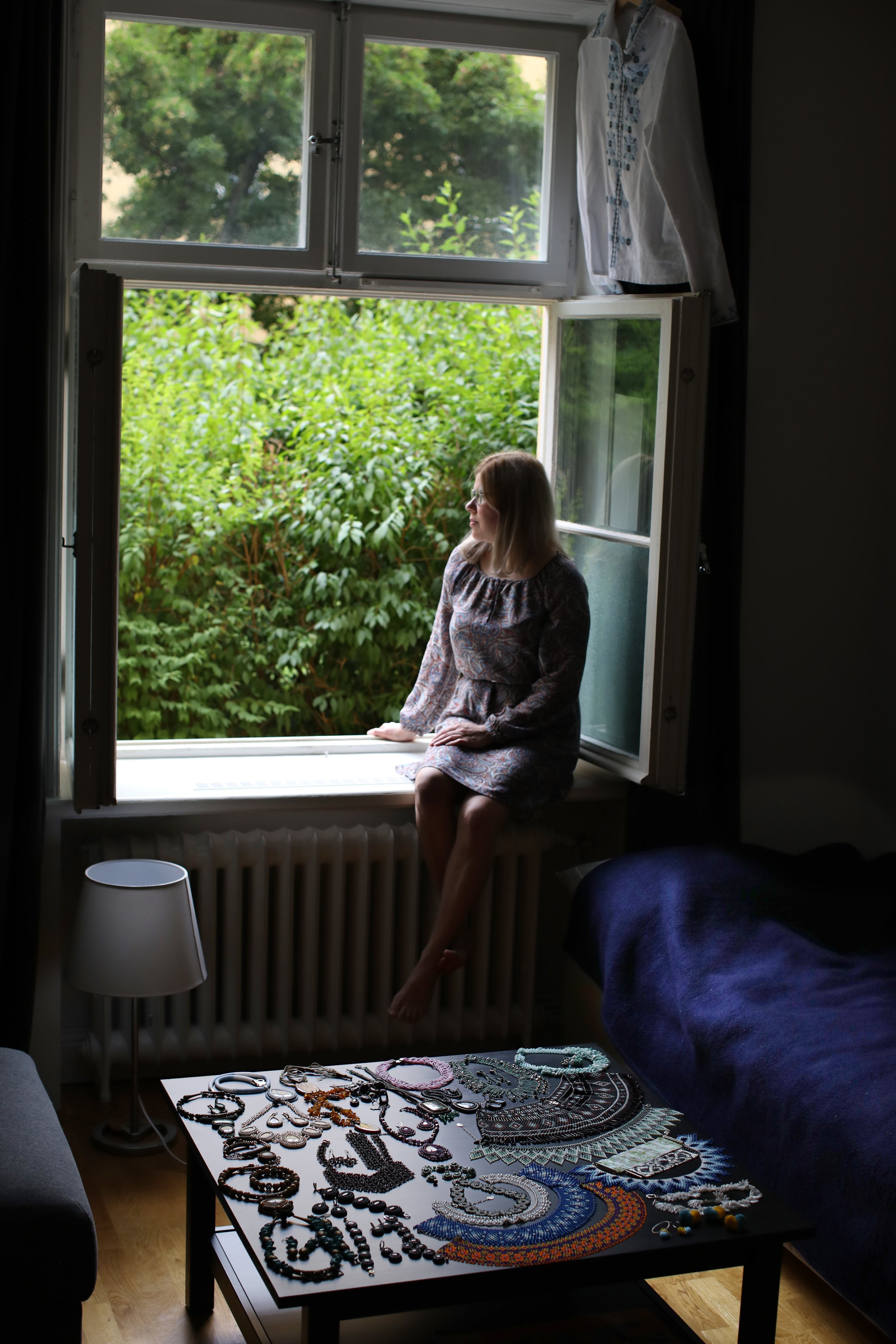Paleontologist, Proud Ukrainian Mom, Doctor of Geological Sciences, Stockholm, Sweden
My next WOW Woman is an absolute legend and an inspiration to me. I met Ms. Olena Shevchuk at a crafts bazaar in Stockholm, Sweden. I was looking for Ukraine-related pieces and bought the blue and yellow earrings she created. We began talking, became friendly and she, upon finding out that I was alone in Stockholm, invited me to her home for a Ukrainian meal. Over borscht and vareniki, I found out that Ms. Shevchuk is a paleontologist who fled Ukraine.She saved her son and provides for the family back in Ukraine by working at the University of Stockholm and the Stockholm’s Museum of Natural History. Olena works with the dinosaur bones, just like a real-life WOW Woman Indiana Jones. Olena wrote the introduction below in English, so I will not write anymore, but leave it to you to read.
Update: It is Oct 10th, 2022. During morning rush hours, russia has bombed twelve cities throughout Ukraine; in an organized act of terror. Ms. Shevchuk’s family are, in this present moment, in Kyiv’s underground, waiting out the bombings. Olena is in Stockholm worrying and keeping in constant contact with her loved ones. The words below take on a different meaning when keeping in mind the volatility of the unknown terror and the distance from family who are in the land targeted by russian missiles. Understandably, Olena constantly worries non-stop about her family.
It is now Oct 17th 2022, and Kyiv has just been hit by the kamikaze drones sent by the russian federation. The atrocities suffered by the every day Ukrainian residents are innumerable. Brave women and men are carrying on, and the enemy will be defeated!
____________
My name is Olena Shevchuk. I am a UKRAINIAN (and now I can proudly write it with capital letters), originally from the south-west of Ukraine and later on – a Kyiv citizen and a scientist. I am 45 years old. I am a mother of two. A wife. A daughter. Until recently, I lived and worked in Kyiv at the Institute of Geological Sciences of the National Academy of Sciences of Ukraine. I headed the Department of Stratigraphy and Paleontology of Mesozoic Sediments, and also conducted lectures at the Kyiv University named after T.G. Shevchenko, at the Institute of Geology. That is pretty much all the basic information which, in the past couple of months I have been constantly repeating to everyone around. And to myself. These appear to be the only sentences and words, engraved into my consciousness, that are constant and remain unchanged in these times.
This is because, on February 24, 2022, everything else in my life changed. Drastically, as you can imagine. At 5 a.m., I woke up to the sounds of explosions, and my husband saying, "Putin has started a war." The outskirts of Kyiv were shelled within a radius of about 15-20 km. A few hours later, traffic jams and sirens of emergency services vehicles paralyzed the city. Tens of thousands of cars containing many thousands civilian residents were fleeing Kyiv. My oldest son and his partner were trying to get to us across the opposite side of the city, armed with bags stuffed with personal belongings they considered vital. Their journey seemed to be infinite to me, the whole city seemed to be holding its breath, wondering what the next sound of explosion was going to bring.
On the first day of the war, we collected all our documents, held an online meeting with our colleagues and the management of the Institute, and discussed the current situation. I believe, and what seems now really super heroic of them, every Ukrainian company and an enterprise held such meetings with their staff. The news headlines were constantly being monitored; it was reported that columns of the Russian troops helicopter grouping were approaching Kyiv to seize Ukrainian authorities and government.
In the evening, the air alarm was announced on TV. We packed blankets, folding chairs, sleeping bags and went to spend the night in the underground parking lot. After considering every option. this appeared to be the safest. Now it is naïve, but that night, when we received the messages that Kyiv will fall in the morning, and they will shell the city from above, this parking lot was our Khortytsia fortress. At first there were few people, but closer to midnight it became more and more crowded. The space became filled with crying toddlers and whispers of the elderly; we continued to listen to every sound coming from the street, counting the number of “incoming calls aka bombs” from Russian troops. The bravest souls in the garage went out to gaze; they came back with the good news: “These were the sounds of our Ukrainian air-defense,,”they said.
In the morning, as soon as the curfew ended, we decided to go to the south-west of Ukraine, to my hometown. At this point, some fighting was already taking place on the streets of Kyiv. We drove 600 km, six people in a small car. Everyone was terrified. The road was partially blocked due to the fire from a rocket explosion. Our route had to be constantly changed and instead of the six hours, we spent twelve on the road; we didn’t even make one tiny pitstop for food, as we just wanted to be safe. Other friends and relatives of ours spent close to 24-28 hours on even smaller routes. Most of the cities in Kyiv were blown up in order to prevent the Russians from entering the capital.
Having arrived to my home town in the Chernivtsi region, I continued working online. Our family took in a few friends who were also fleeing the war, a tiny impact we could make.
On the first day of the war, my old colleague with whom I have been in collaboration with for over ten years, professor Vivi Vajda from the Stockholm Museum of Natural History, reached out to me with deep concern. Vivi compassionately invited my youngest thirteen-year-old son and me to come to Sweden, to take part in a competition to obtain a grant for Ukrainian scientists. Vivi, like no other, understood the political situation between Russia and Ukraine. As far back as 1956 her mother fled the Russian tanks in an anti-communist uprising in Hungary; she travelled from Budapest to Sweden.
It was frankly a torture for me to decide whether to leave Ukraine. My elderly parents, my dearest husband and a 22-year-old son could not leave. It would be just me and my youngest son. Each Ukrainian woman, no matter how old they are, who were standing at the border and looking back, were on the verge of madness: to choose motherhood over patriotism or vice versa. Such were my feelings.
On an early, cold March 7 morning, my son and I crossed the border into Romania, on foot. We were part of a multi-kilometer-long human column of Ukrainians. It consisted mainly of the elderly, mothers and children. We felt it endless. In Romania, we were met by a female volunteer, a parishioner of the Evangelical Church; she gave us shelter, fed us and took us to small airport.
When we had finally arrived to Sweden, we stayed for a few weeks at dear Vivi's house. She kindly and open-heartedly provided us with everything we needed. My son and I decided first to attend the migration service and apply for the temporary protection in accordance with the EU Directive 2001/55 /EC. Thanks to the miraculous generosity of the volunteers, we received warm clothes and the necessary hygiene products, since we all travelled light preparing for long distance walking. In addition, the University of Stockholm kindly provided us with free housing until I was paid.
Why did I choose Sweden? Because I have been here several times and collaborated with other scientists. Because my specialty is quite unique and my diploma is active, I was able to secure myself a paid job. I did not expect any help from the Swedish government and always wanted to work and contribute. As a result, I have received a grant from the Swedish Research Foundation and now work at the center for Paleogenetics, in Stockholm University’s Department of Paleobiology of the Swedish Museum of Natural History.
Additionally, my hobby came in handy and serves as additional income. I create necklaces, bracelets, earrings and other jewelry pieces made out of beads and natural stones. I sell my creations at a Sunday Fair here in Stockholm. Beading calms me down, takes my mind off the news I'm otherwise constantly reading.
During this tumultuous time for my country, the values of every Ukrainian woman have changed. All the new acquaintances and new girlfriends I have met here, we all arrived in Sweden with a different story, and different set of experiences. However, we all harbour the same anger toward the aggressors and have a mutual goal: to grow a healthy Ukrainian nation. Since the moment we took our children out of Ukraine, the enemy had no chance; our children will remember this war and pass on the hatred for Russians from their generation to the next. We will not forgive Russia’s barbarity and violence toward our people. I like that the women here have seemed to have “gathered all their troubles into a fist,” they are truly trying to do something. For example, Ukrainian refugee teachers organized themselves and continued to teach kids in Sweden, according to the Ukrainian school curriculum. I took part in this effort, and taught the children how to make bracelets with the Ukrainian symbols from beads. Other women prepare borscht and dumplings (traditional Ukrainian food), as future ideas for the expansion of the restaurant business for the Swedes. There are many such examples, as the Ukrainian diaspora in Sweden is strong.
I have been engaged in science all my life, I am a paleоnеologist, I have more than 120 scientific publications, and for the last 10 years I have been working closely with my colleagues from Europe and around the world. With this cooperation, I want to emphasize that Ukraine is part of a progressive world that seeks to develop and improve. And I have never imagined, that I will have to highlight this fact under such circumstances.
I miss my homeland every second of my life, I see my family in everyone who passes by; I yearn for my colleagues who work in Ukraine and had to remain there. I am infinitely grateful to Ukraine's allies for their help, but most of all to our defenders and the Armed Forces of Ukraine. They are resisting the aggressor incredibly bravely and liberating Ukraine from the Russian occupiers.
I believe that the time will soon come when I will be able to return to my homeland and reunite with my family; when Russia stops killing our children and civilians, bombing our hospitals and houses, when the sounds of sirens will cease, and this will become one of the darkest chapters in our country’s history.
Life is strange somehow. Sometimes I can't believe that all this is true. To be able to simultaneously have anxiety about the future, harbour faith in victory, while still working, and continue living. As with every woman, this is not the end of the story. There will definitely be a sequel, but at this time, it is not so predictable. The main indicator will be how long the war will last.
1. Name
Olena Shevchuk.
2. Where were you born?
The city of Sokyryana, Chernivtsi region, Ukraine.
3. What is your profession/career/title/self-designation/designation? What does your typical day look like?
Purpose: Mother, wife.
Profession: Paleontologist.
Title: Doctor of Geological Sciences.
4. What was the journey like to get where you are (in life and career-wise)? Write about some of the achievements that you are most proud of. What was the moment for you that changed your life (in your personal life and/or career?) that set you on the current path in life? What did you do before the war, and why and how did you start helping Ukrainian women?
Please read above.
5. Was there a time when life knocked you down or out and how did you get back up on your feet?
Of course, there was such a time, but I don't want to write about it anymore, because everything seems trivial now, compared to the war going on now in my home country.
6. Advice for other women?
Believe in yourself, don't use people for your own selfish purposes. I learned from the Swedes to give children the opportunity to be children. But I just envy them, because our Ukrainian children grew up in an instant in February this year.
7. Where in the world do you feel “tallest” (i.e., where is your happy place)?
With my family, all of us together.
8. What extracurricular activities/hobbies are you most proud of? Why?
I love beading, embroidery and, in general, needlework in any form. In six years, I made about 300 bead and stone products, so I am very happy when my work is appreciated and my products are worn by friends, relatives, and colleagues.
At first, I learned to embroider, then to collect necklaces and find beautiful stones and materials. I enjoy the act of combining these gems into jewelry pieces. I started working with beads six years ago. Truthfully, I have never studied anything so eagerly and consistently; I would dedicate time to this on a daily basis. And all this for one purpose, to make beautiful jewelry and bring women joy. This is my one true hobby!
9. Have you travelled solo? If so, which were some of the most memorable destinations and why? Why do you travel and would you recommend it to women?
I have not traveled alone, I always travel with my family or colleagues. Every year, my husband, children and I would go on a summer vacation, to the sea. At first, of course, it was Crimea, but we were there for the last time in 2013 (before the illegal russian takeover). In recent years, we spent holidays in Croatia, Greece, Montenegro, Spain, Turkey and Egypt. We also travelled through the Balkans many times, drove through Bosnia, Serbia and Croatia. I paid attention to those houses that were damaged during the conflict, during the breakup of Yugoslavia, and remember thinking how terrible it was and why such civilized European countries could not resolve their conflicts peacefully. After all, this was Europe in the 21st century!
I often travelled on business trips abroad, as I am a geologist. I was in South Africa, in Cape Town, took part in the geological expeditions in China, traversing the entire Eastern part of China. I also spent time working in the province of Northern Mongolia. Finally, I enjoyed participating in geological work in United States, in the Colorado Plateau.
The biggest impression was made by the Kirstenbosch Botanical Garden in Cape Town. I loved the incredible biodiversity of vegetation there. It was in South Africa that I first saw beadwork with their local motifs at a bazaar and noted for myself that there is something similar bright in their culture as in our Ukrainian beadwork.
After my South Africa work trip, I knitted my first Ukrainian Sylyanka.
** Silyanki, or braids, are equal strips of beads that are tied at the back of the neck. The name comes from the method of making such ornaments, "silyannya" - stringing beads on a thread. Women wore narrow, two to three centimeter silyankas every day as a charm.
Yes, traveling is very interesting, and would definitely recommend it to women. How many beautiful, new and educational things there are in the world! You can discover nature, climate, people-cultures, animals-plants.
10. What fears do you still hope to overcome?
Fear of material loss and loss of health.
I can not swim so there is fear of water. I'm not sure I'll get over that one.
I thought I couldn't defend myself, but "what doesn't kill us makes us stronger."
11. Anything you'd do differently, if you had another go at life?
Yes, I would like to be a doctor and bring direct benefit to people.
12. What/who inspires you?
Being useful to others.
13. What are you hopeful about?
I do not hope, but believe in an unconditional love; it is in everyone. Some have it deep inside, others have it on the surface.
14. What are some ingredients to a good life? How did the global pandemic and war in Ukraine change your perspective about the world, about your life, your goals and dreams?
First, to be in harmony with yourself.
Health is the main component of life.
The war in my country radically changed everything. The pandemic was predicted.
Every Ukrainian has the same dream now: peace. The goal is to rebuild our nation.
What do you want the world to know/realize/understand/appreciate about Ukrainians and Ukrainian women in particular?
We are good at rallying and helping each other in difficult situations. But we seemed to always have some trouble understanding this. We are like those ants in an ant hill: we live for ourselves, we quarrel, but as soon as someone attacks the ant hill, we immediately attack the enemy, collectively as a group. This is Ukrainians.
Ukrainian women are persistent and business-minded.
15. What would you tell your 14-year-old self?
(1) Learn foreign languages. (2) The world does not revolve around you. (3) Being a parent is not easy.
16. Who is a WOW WOMAN in your world who inspires you and why? Can you nominate three (or more) women you know who perfectly fit WOW WOMAN description? What would you tell them, if you had an opportunity, about why you admire them?
WOW Women for me are not public figures. They are on the war front, working in the hospitals, rescuing others in ambulances, volunteering. WOW Women for me are those Ukrainian women who fled the russian bombs, who are now abroad, alone or with children.
17. Where can others find you/your work (website links, blogs, etc.)?
Instagram: @olena.shevchuk.944
Stockholm University: Researcher Profile .
1. Where were you when the attack happened? Did you believe in the possibility of RF attacking Ukraine's key cities and proceeding with the full-on aggression?
During the first bombings, I was at home in Kyiv and felt truly scared.
I didn't believe the attack would happen until the last moment. I still thought and believed that people were move evolved than this. Aren’t we supposed to be in the time when all nations gravitate toward nanotechnology, improvement and development? War is degradation!
I knew that the russians were aggressive and arrogant, etc., but the Ukrainian civilian population could not even imagine that they would kill children! The horror of 2022!
The brain still does not want to compute all the atrocities. We are in the 21st century afterall, the time when the entire planet is thinking about ecology, inventing high-tech devices, artificial intelligence, electric cars. We are supposed to look forward, into a brighter future. Yet here we have a freak country, bursting onto a foreign land and barbarically destroying everything that it could not themselves provide and build for its own russian citizens. It’s horrific.
Regarding the 2014 Crimea takeover by the russians, and the events that followed on the Maidan square in Kyiv (large protests and change-seeking Ukrainians taking back their country). I will give a simple equivalent scenario. A criminal broke into your house, destroyed your furniture, ate your food, killed your relatives, terrorized you and your kids, and then somehow offered you peace deal: he moves into the living room, and you live in the kitchen.
What nonsense!
Such were, and continue to be, russian peace terms with Ukraine. No surprise, we refused, and the war has been going on for eight years (since the Crimea take over).
2. What was your experience of the day the war started? Where did you go and what do you recall was your plan?
I described this above in the text, in the foreword.
In the first weeks of the war, we all - and I certainly - felt like sprinters. It was necessary to repel all attacks and challenges as quickly as possible. Emotions, strength and adrenaline were at the all time high. We were at our limit.
Now, in the sixth month of the war, we have all become long-distance runners. It seems we are now dealing with a marathon, where it becomes necessary to correctly distribute all our forces and resources in order to traverse the entire distance and win. We should be enough to win. And we are enough! Ukrainian women and men are strong!
3. How are your family and friends doing? How often are you in touch?
My eldest son and husband remained in Kyiv. We communicate twice a day. In the morning I check and ask if they are alive and how the night went. In the evening I ask everyone how the day went, how many sirens sounded, where the bombing took place and how many missiles our air defenses shot down. Then we end the call with a good night.
4. What are some ways you are supporting Ukraine now, from abroad?
I am constantly transferring money to Ukraine’s Armed Forces.
Come Back Alive (Povernys Zhyvym), one of the most accountable and trustworthy charities working for the military in Ukraine since 2014. The charity has been providing the military with auxiliary equipment, specialized software, drones, personal body protection, training, and other supplies ever since the foundation's inception. The charity provides instructions on how to donate, from Ukraine or abroad, and posts financial reports on its website savelife.in.ua/donate.
I send money, clothing and food to my parents by private carriers, who travel to Ukraine from Sweden.
5. What do you want the world to know about Ukrainians during this difficult time? About Ukrainian Women?
My message to everyone is this:
as long as your (and world’s) attention stays on Ukraine, it will be converted into real help. Please do not get used to war. Dozens of people under the rubble are less and less surprising, and this is a tragedy.
Do russians need to invent new methods of terror so that it would be more interesting for journalists to write about the effects of the war? Do we need more victims tomorrow than there are already to-date to have a chance to get to the front page of a newspaper?
Weekly protests organized by the Nordic Ukraine Forum in Stockholm
Human indifference is horrible. The task of mass media and those Ukrainians who have fled abroad is to prevent apathy and vanishment at any cost. For this reason, we (here in Stokcholm) attend demonstrations every single weekend.
6. What will be the first thing you'll do when Ukraine wins?
I will hug my family.
I will continue to thank the defenders, volunteers, and doctors for a long time.
Quick Round Bonus Questions:
1. What and who is worth suffering for? Life and children’s future.
2. If you didn't have to work anymore what would you do with your days? Travel, develop myself and try to do what is useful to others.
3. If you could be anyone for a day who would you be? Nonsensical. Everyone has their own path and everyone pays their own price for success.
4. If you could relive one year in your life, which one would it be? It makes no sense (to wish to relive one year) as one year doesn't solve anything (nor change the trajectory).
5. What bothers you most about people? What do you love most about people? What bothers me in other people is primarily what bothers me in myself. In others, I appreciate sincerity, attentiveness, courage and self-respect.
1. Ім'я
Олена Шевчук.
2. Де ви народилися?
Місто Сокиряни, Чернівецької області, Україна.
3. Яка ваша професія/кар'єра/звання/самопозначення/призначення? Як виглядає ваш типовий день?
Призначення – мама, дружина.
Професія – палеонтолог.
Звання - Доктор геологічних наук.
4. Як ви опинилися тут, на нинішньому місці в житті? Напишіть про деякі досягнення, якими ви найбільше пишаєтеся. Який для вас момент змінив ваше життя (в особистому житті та/або кар’єрі?), який поставив вас на поточний життєвий шлях? Чим ви займалися до війни, чому і як почали допомагати українкам?
Будь ласка, прочитайте вище.
5. Чи був час, коли життя збило вас з ніг або збивало вас, і як ви знову ставали на ноги?
Звичайно був такий час, але я не хочу про це розказувати, тому що зараз здається, що то все були дрібниці, в порівнянні з війною.
6. Що б ви порадили іншим жінкам і дівчатам? Для майбутнього покоління жінок?
Вірте в себе, не використовуйте людей для власних егоїстичних цілей. Навчилася у шведів - давати дітям можливість бути дітьми, але я їм просто заздрю, тому що наші українські діти подорослішали за мить.
7. Де в світі ви відчуваєте себе «найвищим» (тобто де ваше щасливе місце)?
Зі своєю родиною, усіма разом.
8. Якими позашкільними заняттями/хобі ви найбільше пишаєтеся? Чому?
Люблю бісероплетіння, вишивку і, взагалі, рукоділля в довільному прояві. За шість років зробила близько 300 виробів з бісеру та каменю, тому я дуже радію, коли моя праця цінується і мої вироби одягають подруги, родичі, колеги.
Спочатку я навчилась вишивати, потім збирати намиста, потім знаходити гарне каміння і матеріали і складати їх в одну прикрасу. Від моїх перших робіт до сьогоднішнього дня пройло 6 років. Я подумала, щ це час, що я змогла б отримати ще одну вищу освіту. Можливо це і є моя освіта. Осознанна. Я ніколи не вчилась так жадібно і щоденно. І все це для однієї цілі – зробити гарну прикрасу і на радість жінкам. Це моє хоббі!
9. Ви подорожували самостійно? Якщо так, то які місця найбільше запам’яталися і чому? Чому ви подорожуєте і чи рекомендували б це жінкам?
Самостійно я не подорожувала, завжди подорожую з родиною або з колегами. Щороку я з моїм чоловіком і дітьми їздили на літній відпочинок до моря. Спочатку, звичайно, це був Крим, але ми там були останній раз в 2013 році. Останні роки відпочивали в Хорватії, Греції, Чорногорії, Іспанії, Турції, Єгипті. Частенько їздилли на власному авто на відпочинок на Балкани і проїздили Боснію, Сербію, Хорватію і я звертала увагу на ті домівки, що були ушкоджені під час конфлікту при розпаді Югославії і тоді я ще подумала, як це страшно і чому ж все-таки цивілізованим країнам не вдалась вирішити це мирно. Це ж європейські країни і це 21 сторіччя!!! Також я часто бувала у відрядженнях за кордоном, так як я є за спеціальністю геолог. Я була в південній Африці - Кейптауні, приймала участь в геологічних експедиціях в Китаї – вся Східна частина та провінція Північна Монголія, Америці – плато Колородо та інші.
Найбільше враження склав ботанічний сад Кейптауну. Я дуже люблю квіти, рослинність. Саме там я вперше побачила на місцевому базарі вироби з бісеру африканських мотивів і відзначила для себе, що в їх культурі є щось подібне яскраве як і в наших українських прикрасах з бісеру. Після цієї поїздки я сплела свою першу «українську силянку».
Так, подорожувати дуже цікаво, раджу всім однозначно. Скільки всього прекрасного, нового та пізнавального є в світі! Природа, клімат, люди-культури, тварини-рослини.
10. Які страхи ви все ще сподіваєтеся подолати?
Страх матеріальних втрат та втрати здоров'я.
Я не вмію плавати. Я не впевненна, що це подолаю.
Я думала, що не можу себе захистити, але «що нас не вбиває, то робить наш сильнішими».
11. Ви б зробили щось інше, якби знову прожили життя?
Так, хотіла б бути лікарем і приносити безпосередню користь людям.
12. Що/хто надихає вас?
Бути корисним іншим.
13. На що ви сподіваєтеся?
Не сподіваюся, а вірю в безумовну любов, яка є в кожному. В одних глибоко всередині, в інших на поверхні.
14. Які складові для хорошого життя? Чи змінила глобальна пандемія та війна ваш погляд на світ, на ваше життя, ваші цілі та мрії?
Бути в гармонії з собою в першу чергу.
Здоровʼя – головна складова і просто життя.
Кардинально все змінила війна. Пандемія була прогнозована.
Мрія зараз у всіх одна: мир. Ціль – відбудова держави.
Що ви відчуваєте/понімаєте/ціните в українцях і українських жінках, чого ви, можливо, не осознавали раніше (до війни)?
Ми добре вміємо згуртуватися і допомагати одне одному в скрутній ситуації. Але нам треба завжди якась біда, щоб це зрозуміти. Ми як ті мурашки в мурашнику, живемо собі, сваримося, але як тільки на мурашник хтось атакує, вони одразу гуртом нападають на ворога. Це – про українців.
Ваші наполегливі та ділові жінки.
15. Яку пораду б ви дали собі в 14-річному віці? Яку пораду вона б дала?
Вчи іноземні мови. Світ не крутиться навколо тебе. Батьками бути нелегко.
16. Хто така WOW ЖІНКА у вашому світі, яка надихає вас і чому? Чи можете ви призначити трьох (або більше) жінок, яких ви знаєте, які ідеально відповідають опису ВАУ ЖІНКА? Що б ви сказали їм, якби у вас була можливість, про те, чому ви ними захоплюєтеся?
Це не публічні жінки. Wow жінки, вони на фронті, в лікарнях, службах порятунку, волонтери, самі з дітьми за кордоном.
17. Де інші можуть знайти вас/вашу роботу (посилання на веб-сайти, блоги тощо)?
Instagram: @olena.shevchuk.944
Стокгольмський університет: Профіль дослідника.
!Питання українкам!
1. Де ви були, коли стався напад (в цьому році, але, звісно,можна написати і про перше захоплення землі, і про Майдан, і про Крим)? Чи вірили ви в можливість нападу РФ на ключові міста України і продовження повномасштабної агресії?
Під час перших бомбардувань була вдома в Києві, налякалась сильно.
До останнього не вірила про напад, все ж таки думала, що люди еволюціюнували. Зараз час, де всі країни йдуть до нанотехнологій, а війна це - деградація.
Я знала, що росіяни агресивні та високомірні і т.д., але що вони будуть вбивати дітей, мирне населення не могла навіть уявити. Жахіття 2022 року!!! Мозок досі в це не хоче вірити. 21 сторіччя, коли вся планета думає над екологією, вигадує високотехнологічні пристрої, штучний інтелект, електрокари, знаходиться країна-урод, яка приходить на чужі землі і варварським чином нищить все, чого сама не побудувала для своїх громадян.
Щодо Криму, Майдану. Наведу простий приклад. До Вашого будинку увірвався злочинець і все нищить, вбиває рідних, тероризує, а потім зтось Вам пропонує: зупинімося і поговоріть з ним, віддайте йому вітальню, а самі живіть на кухні. Це нонсенс!
Тому, війна триває довго, 8 років.
2. Що ви пережили в день початку війни? Куди ви пішли і який, як ви пам'ятаєте, був ваш план?
Про це описала вище в тексті – моя історія.
У перші тижні війни ми всі – і я точно – почувалися, як спринтери. Треба було відбити всі атаки, всі виклики максимально швидко. Емоції, сили й адреналін були на межі. Тепер, на шостий місяць війни, всі ми – люди, які біжать довшу дистанцію. Треба розподілити правильно всі сили та ресурси, щоб подолати всю відстань і перемогти. Нас має вистачити на перемогу. І нас вистачить!!! Українки –сильні!
3. Як справи у вашій родині? Як часто ви спілкуєтеся?
Старший син і чоловік залишається в Києві. Спілкуємось двічі на день: вранці – питаю чи живі і як пройшла ніч та ввечері - розпитую рідних як пройшов день, скільки було сирен і де було бомбардування, і скільки ракет збили наші ПВО за день, потім бажаю гарної ночі.
4. Якими способами ви зараз підтримуєте Україну з-за кордону?
Перераховую гроші на ЗСУ. Також, надсилаю гроші та сумки з одягом, їжею батькам приватними перевізниками, що їздять в Україну зі Швеції.
5. Що ви хочете, щоб світ знав про українців у цей важкий час? Про українських жінок?
Мій меседж до усіх однозначний: доки ваша увага лишається з Україною, доти вона конвертується у реальну допомогу. Не звикайте до війни, десятки людей під завалами все менше дивують, і це трагедія. Невже росіянам треба вигадати нові способи терору, щоб журналістам було цікавіше про це писати? Невже завтра потрібно більше жертв, ніж сьогодні, аби в них були шанси потрапити на передовицю? Людська байдужість травмує, й завдання ЗМІ та українців, які виїхали за кордон – не допустити цього будь-якою ціною. Задля цього ми кожні вихідні виходимо на демонстрації.
6. Що ви зробите в першу чергу, коли Україна переможе?
Хочу обійняти рідних.
Я ще довго буду дякувати захисникам, волонтерам, медикам.
Бонусні запитання швидкого раунду:
1. За що і за кого варто страждати? За життя та майбутнє дітей.
2. Якби вам більше не потрібно було працювати, що б ви робили зі своїми днями? Подорожувала, розвивалась, була корисним для інших.
3. Якби ви могли бути кимось на один день, ким би ви були? В цьому немає сенсу. У кожного свій шлях і кожний платить свою ціну за успіх.
4. Якби ви могли б пережити один рік свого життя, який би це був? Немає сенсу, один рік нічого не вирішує.
5. Що вас найбільше турбує в інших людях? Що ви найбільше любите в інших людях? Те що мене турбує в інших людях знаходиться в першу чергу в мені. Щирість, уважність, сміливість, самоповагу.

